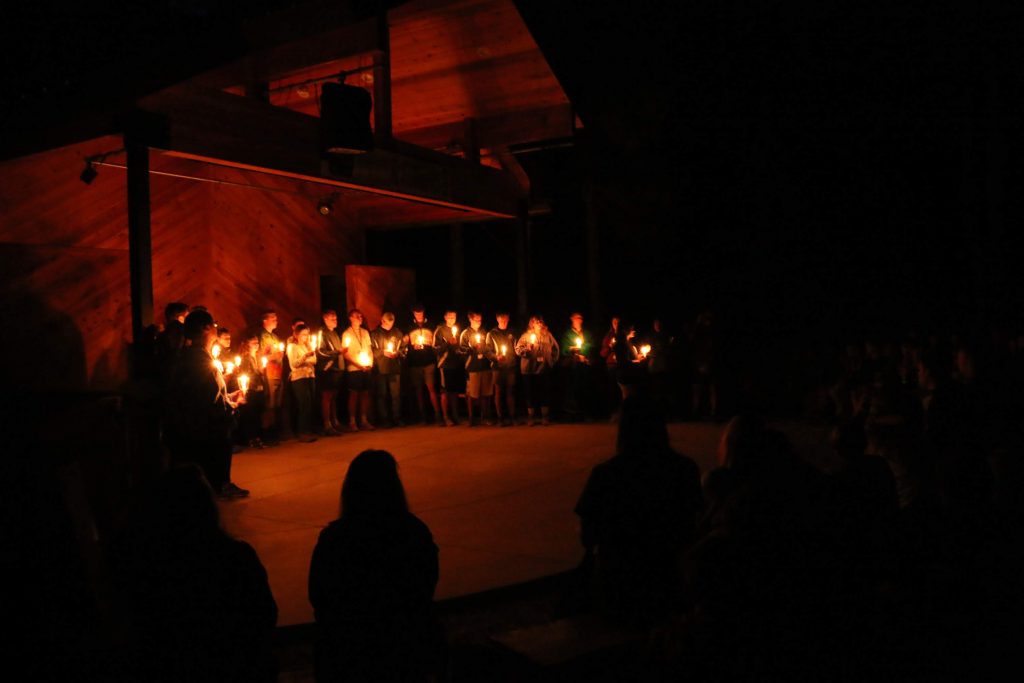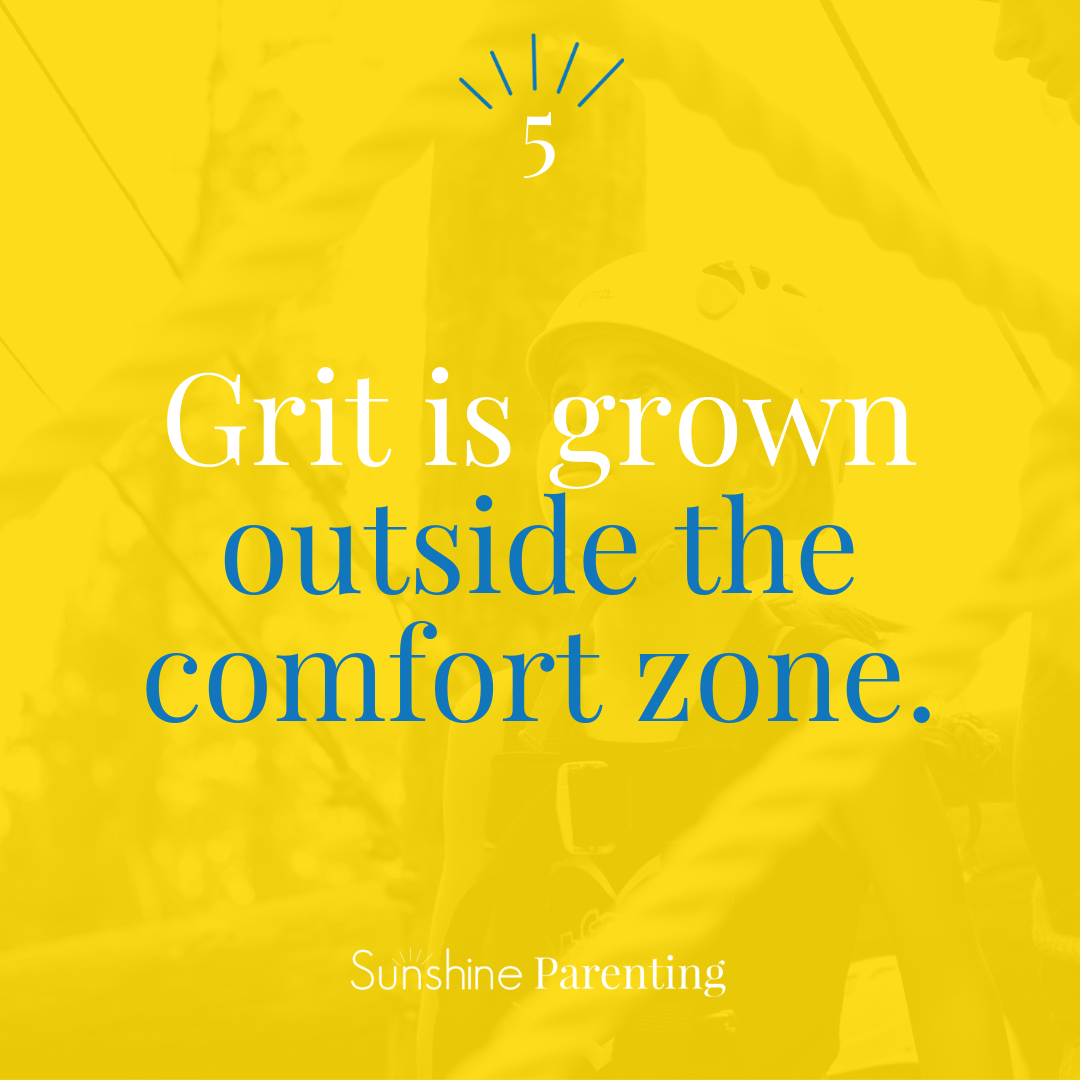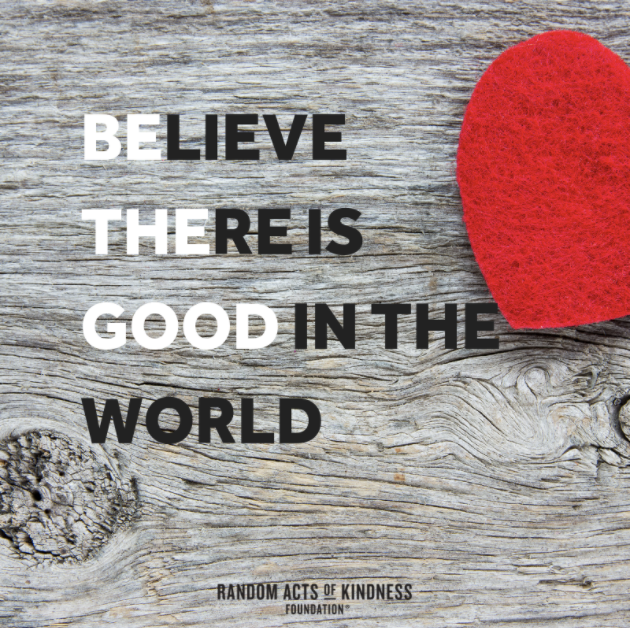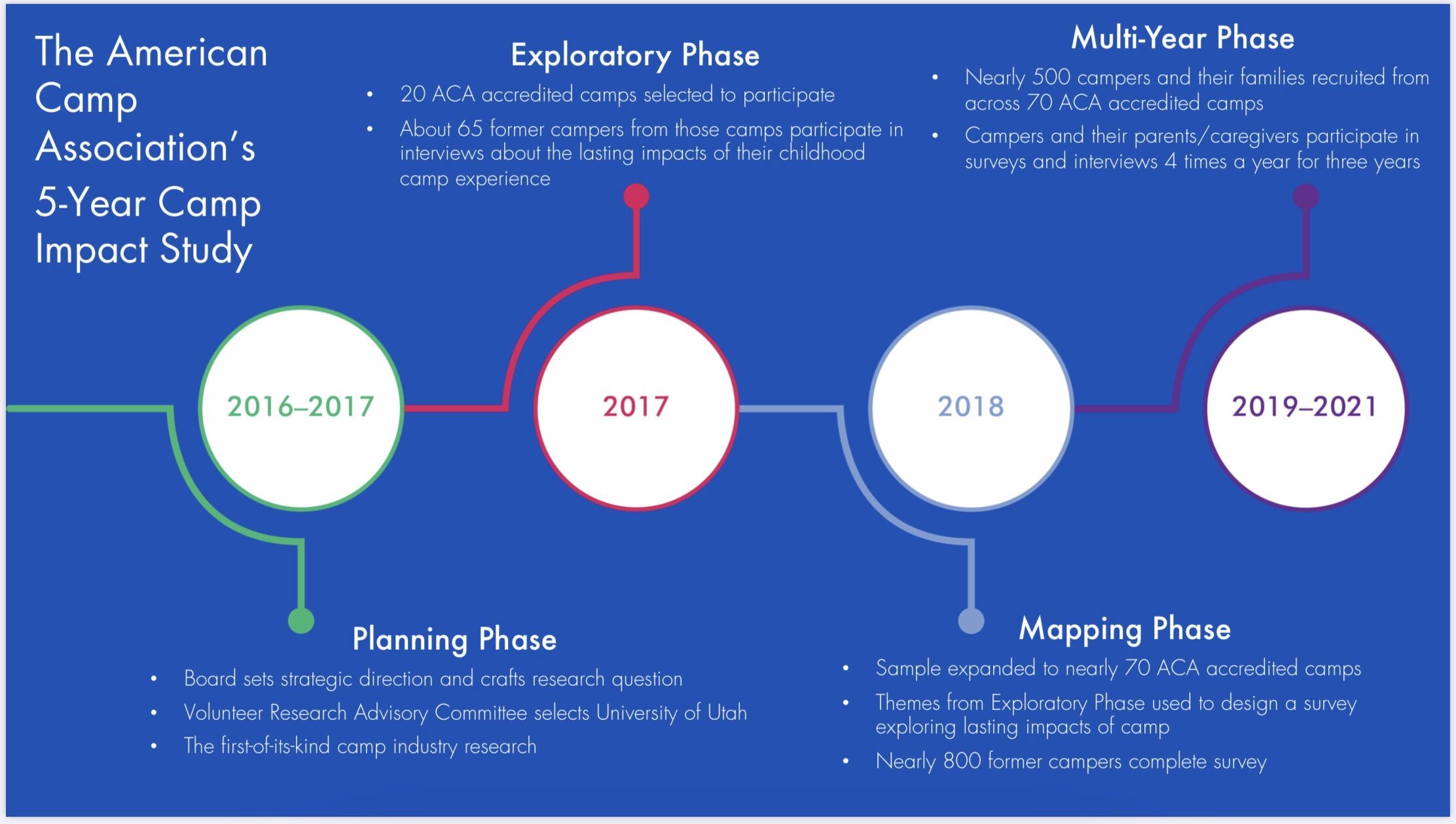Bears’ Adventure
A kid today can likely tell you about the Amazon rain forest – but not about the last time he or she explored the woods in solitude, or lay in a field listening to the wind and watching the clouds move.
-Richard Louv, Last Child in the Woods
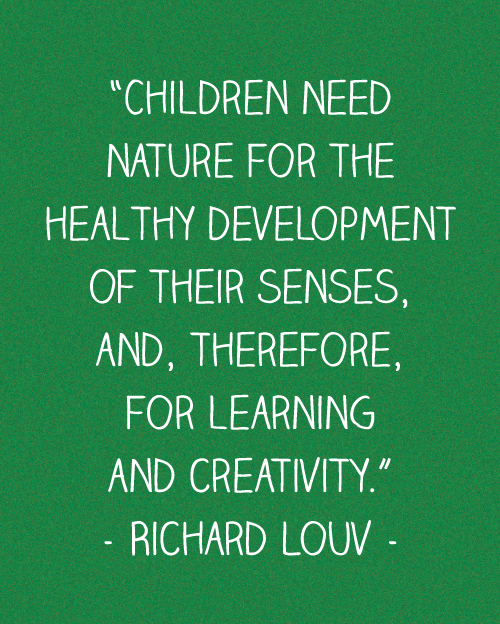 At GAC, “getting outside to experience the awe of nature” is one of our core values. Many of our campers, who primarily live in cities or suburbs, have never had the opportunity to live in and experience nature up close. The rustic set-up of our living areas, which are large tents on wood platforms, allows campers the feeling of being close to nature throughout their stay at camp. With no electricity (and the distractions inherent with being plugged into technology), campers truly get to experience living outdoors. From their tents, campers can hear birds chirping, the water running in the creek, and the breeze rustling the tree branches. Evenings include relaxing chats and stories around the campfire while the sun sets and the stars come out overhead.
At GAC, “getting outside to experience the awe of nature” is one of our core values. Many of our campers, who primarily live in cities or suburbs, have never had the opportunity to live in and experience nature up close. The rustic set-up of our living areas, which are large tents on wood platforms, allows campers the feeling of being close to nature throughout their stay at camp. With no electricity (and the distractions inherent with being plugged into technology), campers truly get to experience living outdoors. From their tents, campers can hear birds chirping, the water running in the creek, and the breeze rustling the tree branches. Evenings include relaxing chats and stories around the campfire while the sun sets and the stars come out overhead.
Campers experience the wonder of nature from the moment they arrive at camp, but there’s just nothing quite like being really far from “civilization” and even further out into nature. Because we’ve experienced how life-changing it is for campers, getting our campers even deeper into the woods is also a priority. With even fewer distractions than what they experience at main camp, our backpacking program serves the purpose of getting our campers completely immersed in nature. For campers who have completed 4th-5th grades (our “Tigers” age group), their cabin group is scheduled for a one-night overnight backpacking trip. Campers get to experience exploring, sleeping, cooking, and living in an even more rustic setting than their camp tent home. I wrote about one of these magical Tigers’ backpacking trips in my post, “Nature Pees and Lanyard Fishing Poles.” Our older campers, the Lions and Eagles (who’ve completed 6th-9thgrades), have the option of signing up for a backpacking trip, one of the most popular choice options for their free choice days.
But a highlight of the two-week session for our youngest campers (grades K-3), and their version of “backpacking,” is Bears’ Adventure. This one-night trip allows campers to experience sleeping outdoors under the stars and cooking over a campfire. Campers’ luggage is taken for them to the campsite, so they are not technically “backpacking,” because they have no pack to carry. With just their water bottle and their positive attitudes, they set out from camp singing and talking on their hike. Once they get to their destination, which feels far from camp (although it is less than a mile away), they are rewarded with a spectacular view of Huntington Lake and the surrounding wilderness area. They truly get the feeling that they have been on a long, adventurous hike.
The best part of Bears’ Adventure is the free time kids get to play and explore the area. For many campers, the longer sticks provide the perfect start to a fort. Others enjoy laying on their sleeping bags talking with friends or silently watching clouds move overhead. Some participate in crafts and games while enjoying being outdoors. For many of these kids, Bears’ Adventure is their first experience “roughing it,” and they absolutely love it.
When they hike back into camp the morning after their Adventure, our Bears’ campers stand a little taller. And their dirty, smiling faces are the best indication that they have experienced the awe of nature.
Leaving No Trace at GAC
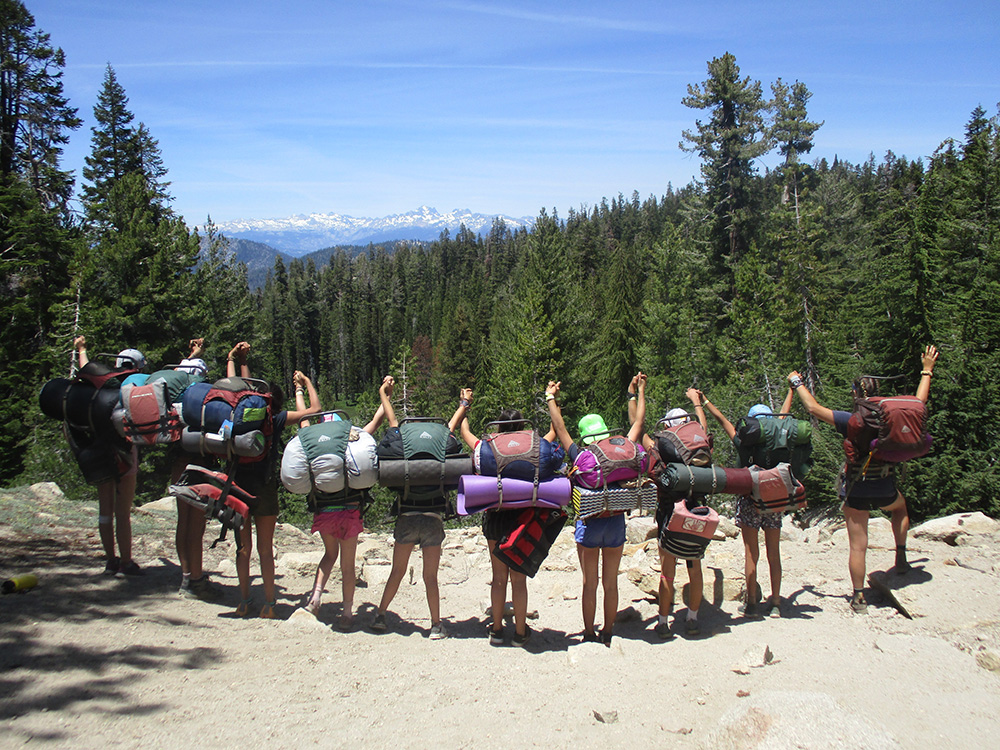 Here at GAC, we believe that camp leaves a lasting impact on everyone who experiences it. However, in our backpacking and nature programs, we’ve been working hard to have a smaller impact. Not on campers, but on the environment we camp in! This year is our fifth summer working with the Leave No Trace Center For Outdoor Ethics to become a Leave No Trace Accredited Youth Program. With the guidance of the LNT’s 7 principles, we’ve been making a conscious effort to decrease our impact on nature even as we send more campers into the beauty of the High Sierra!
Here at GAC, we believe that camp leaves a lasting impact on everyone who experiences it. However, in our backpacking and nature programs, we’ve been working hard to have a smaller impact. Not on campers, but on the environment we camp in! This year is our fifth summer working with the Leave No Trace Center For Outdoor Ethics to become a Leave No Trace Accredited Youth Program. With the guidance of the LNT’s 7 principles, we’ve been making a conscious effort to decrease our impact on nature even as we send more campers into the beauty of the High Sierra!
One of our core values is that we want campers to “experience the awe of nature.” All of our campers have an opportunity to experience nature outside of our traditional camp property. Our youngest campers have an overnight of tent camping (we take care of moving their luggage) that we call Bears’ Adventure. Our middle campers spend one night underneath the stars on a backpacking trip into the Kaiser Wilderness of the Sierra National Forest as a part of our backpacking program. Our oldest campers are given the opportunity to sign up for a backpacking trip, and many do. We even offer a special program, the Outdoor Leadership Course, for teens who want a more immersive experience in the backcountry. All of these programs adhere to The 7 Principles of Leave No Trace:
- Plan Ahead and Prepare
- Our trips are planned well in advance and led by certified instructors. They are well versed in how to lead trips with minimal impact on nature.
- Travel & Camp on Durable Surfaces
- We use well-established trails and sleep on durable surfaces. We are happy to be able to utilize the established trails and camping sites in the national forest.
- Dispose of Waste Properly
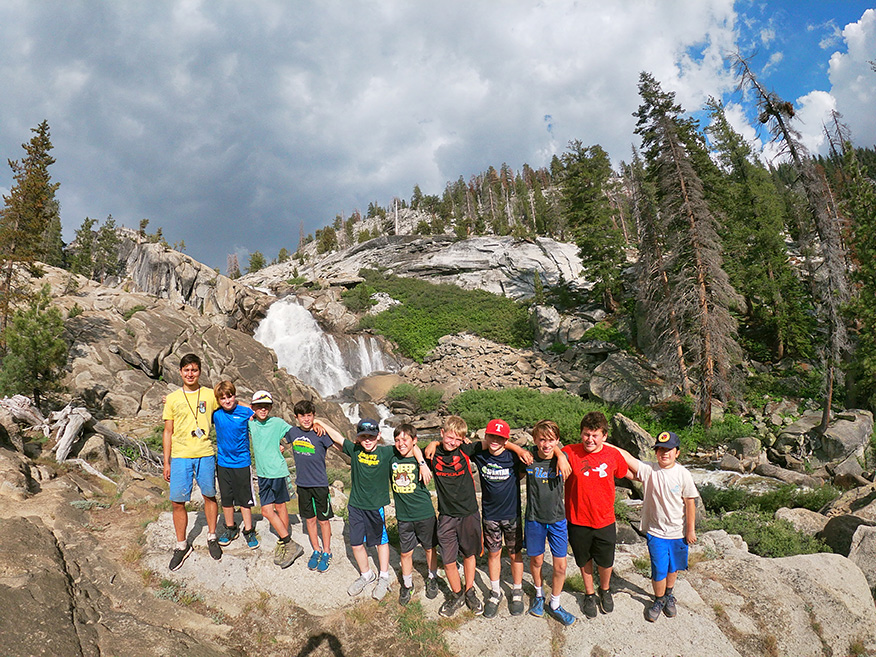
- Our backpacking trips offer the opportunity for campers to “nature pee,” which is an experience fewer and fewer children have today. The trips also offer the opportunity to learn why it’s important that we do not use toilet paper in the wilderness, and that if TP is necessary, we’ll pack it back to camp for proper disposal.
- Leave What You Find
- It is tempting to bring home a giant pinecone as a souvenir, but our counselors remind campers to “leave only footprints, and take only photographs.” Our campers bring home plenty of photographs (and other memories).
- Minimize Campfire Impacts
- Campfires are an important part of our program, and we work hard to minimize their impact on the backcountry by using established fire sites and keeping the fires small.
- Respect Wildlife
- We love to see wildlife on a trip, but we know that the forest is their home. That’s why campers and staff never approach wildlife. Instead, they experience wildlife at a distance, in its natural habitat.
- We also respect wildlife by making sure that we aren’t tempting them with food. In camp, we don’t allow food (or even food trash) off of the Dining Porch. On the trail, every bit of food and food trash stays in a “Bear Canister” to prevent us from becoming attractive to forest friends who would like to share our dinners!
- Be Considerate of Other Visitors
-
- We’re thrilled when other people get to share our backyard! We’re friendly on the trail, but also make sure we respect their space and their desire to be in nature as well.
-
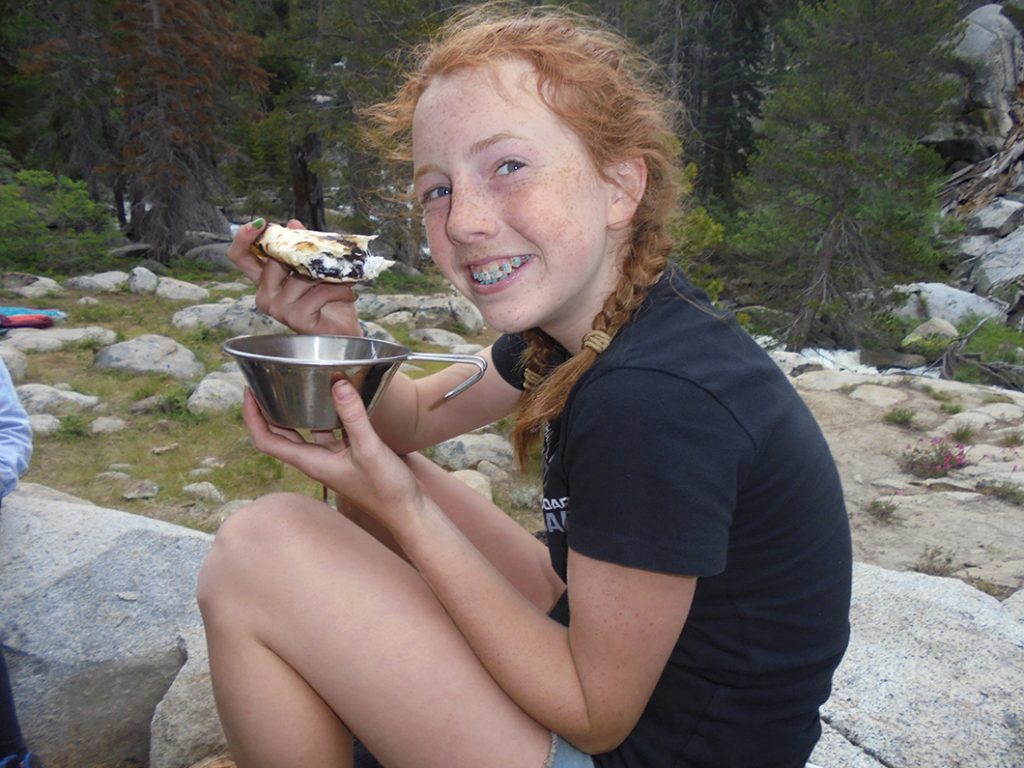
When campers are introduced to their program, the backpacking counselors review the LNT 7 principles as a part of the safety discussion before any trip departs. We even have a banner that hangs on our backpacking shed so that they can read along!
The backpacking counselors also lead two different types of programs in camp, called nature and OREO (Outdoor Recreation Educational Opportunity). The goal of OREO is to teach campers to appreciate nature while spending some time out of camp on a day hike and bonding with their cabin group. At the end of the hike, there’s even a reward that shares its name with the acronym OREO!
The goal of the nature program is to support GAC’s core value of experiencing the awe of nature and let campers play games to connect them to nature. We know that exposing campers to the beauty of nature will help them develop a personal connection and want to protect it for future generations.
Since 2017, we have been close partners with the Leave No Trace (LNT) Program and have educated our campers on the 7 LNT principles before every backpacking trip and OREO hike. We are dedicated to minimizing our impact on the Sierra Nevada and helping our campers understand WHY it is important, both for nature and for future generations. We hope that if you head out for some adventures in nature you and your family can also minimize your impact!
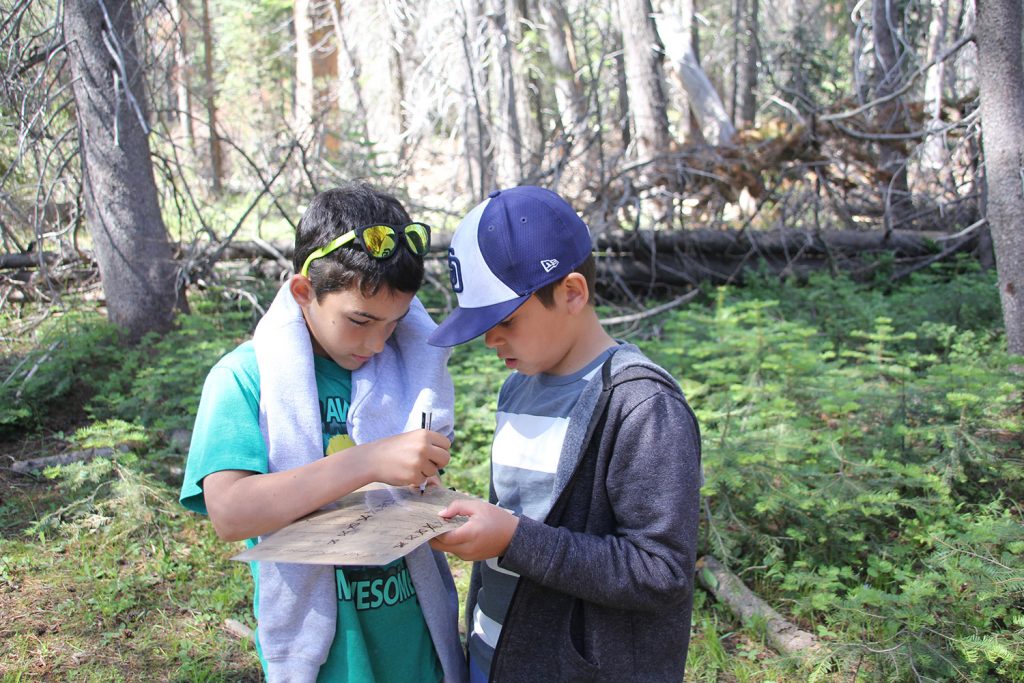
All in the Family: GAC Staff Siblings 2021
Many of our GAC camper families include multiple siblings who attend camp each summer, so it’s not surprising that when campers return as camp counselors, they often overlap with their siblings who work at GAC, as well. This summer, we’re grateful to have an especially large group of staff siblings, including:
Sneaks & Shred
Flaps & Otter
Peanut Butter & Agave
Magic & Maps
Ski & Sis
Butter & Jam
Quest & Jupiter
Mariachi & Liono
Gatsby & Vinci
Falls & Aqua
Foxtrot & Squid
Hood & Odin
Donatello & Anmut
Skillet & Catavee
Spock & Lyric
Astro & Minty
Truffle & Spotlight
Gem, Latte, & Goat (not pictured)
To learn more about each of these amazing GAC staffers, check out MEET OUR STAFF.
Grit is Grown Outside the Comfort Zone
Listen to Sunshine Parenting Ep. 85: Grit is Grown Outside the Comfort Zone:
Episode 85 of the Sunshine Parenting Podcast, was recorded live at Pegasus School in Huntington Beach as part of their PEGtalks Parent Education Series. I’m with my frequent guest, Sara Kuljis, the owner and director of Yosemite Sierra Summer Camp and Emerald Cove Day Camp. We talk about my book, Happy Campers and discuss Camp Secret #5, Grit Is Grown Outside the Comfort Zone.
Read more in 5 Ways Camp Grows Grit.
BIG IDEAS
- Kids tend to be more courageous and try more things when their parents are not around.
- It’s important for parents to learn how to help their kids to become resilient human beings and take risks even when they’re near us.
- It’s really important for kids to grow their grit-muscle.
- Parents need to fight the tendency to overprotect their kids because too much protection makes kids fragile.
- When parents jump in to rescue their kids it doesn’t usually work out too well.
- Kids need to see their parents as real, authentic people. This reassures them.
QUOTES
Sara: “This book is just packed full with so many awesome parenting tools drawn from the camp environment.”
Audrey: “I found myself talking to camp parents a lot more about things that were going on with their kids at home, about things that we do at camp that they could try to make their kids feel better and happier at home.”
Audrey: “I also found that a lot of the training we did with our counselors, about just basic positive behavior management techniques, friendship skills, was really applicable to parents.”
Audrey: “We believe in summer camp for kids, but even more so, I believe in the great experience it is for camp counselors. The experiences of having to lead a group, manage kids, learn how to speak and lead positively, learn how to manage conflicts, clean up throw up–these are skills that are really beneficial when you do become a parent at some point later in life.”
Audrey: “Kids tend to be more courageous and try more new things when parents aren’t sitting right there. We are really fortunate to see a ton of growth in this area at camp because we get to have these kids in this environment where they are suddenly feeling like, ‘OK maybe I can try this’.”
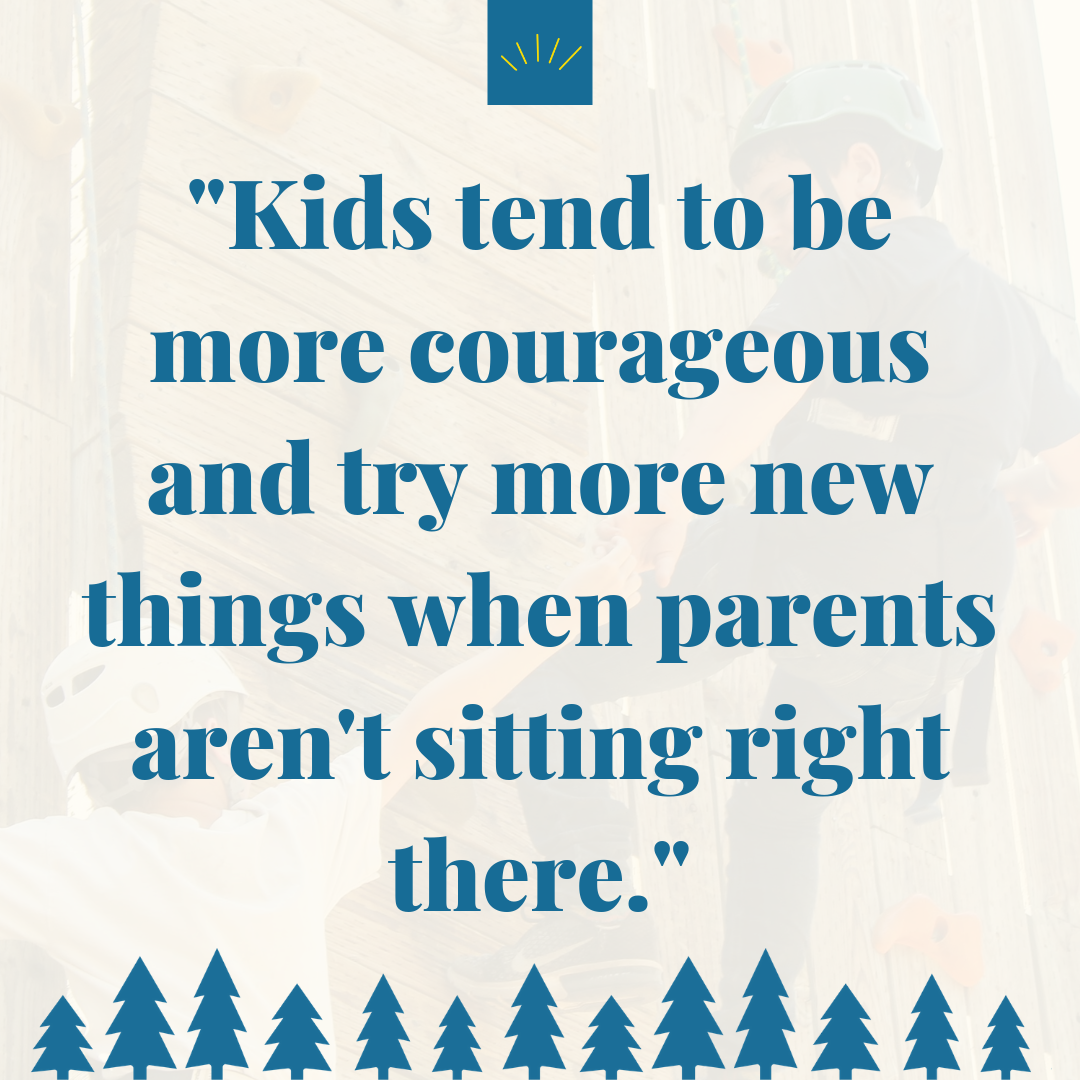
Audrey: “We must learn how to help them become resilient human beings, even when they’re near us. We’re seeing a lot of the results of kids who aren’t growing that kind of resilience. It comes out when they’re teenagers or young adults as serious mental health issues because they don’t feel that they have the capacity to bounce back from the normal setbacks and problems of life.”
Sara: “Think of grit as a muscle. You don’t start lifting 400 lbs at the gym; you start small. Little by little, you bump up that weight on the bench press. It’s fun to think of ways that even our little humans can start to grow their grit muscles. When, in time, you’re sending that big human off to college, hopefully, they have grown some good muscle. That freshmen year isn’t so overwhelming because they have practiced folding their clothes and doing their laundry. They have gone to talk to their teacher and can advocate for themselves. They have had to suffer through a disappointing grade. They can make new friends and say ‘I’m sorry’ to a friend. All those little grit-muscle growth opportunities are essential.”
Audrey: “I first heard the term ‘grit’ in Paul Tough’s How Children Succeed. In their research, the trait that they found that was most predictive of successfully completing college was grit or resilience. It’s a really important trait in all areas of life.”
Audrey: “As a parent, it’s our natural inclination to want to protect (our children) their whole life. If we keep protecting them too long and too much, we end up making them fragile. You have to be blown around and have some hardships to get strong. If you keep your child too protected from any kind of physical, emotional, or social pain for too long they can be blown over by little things.”
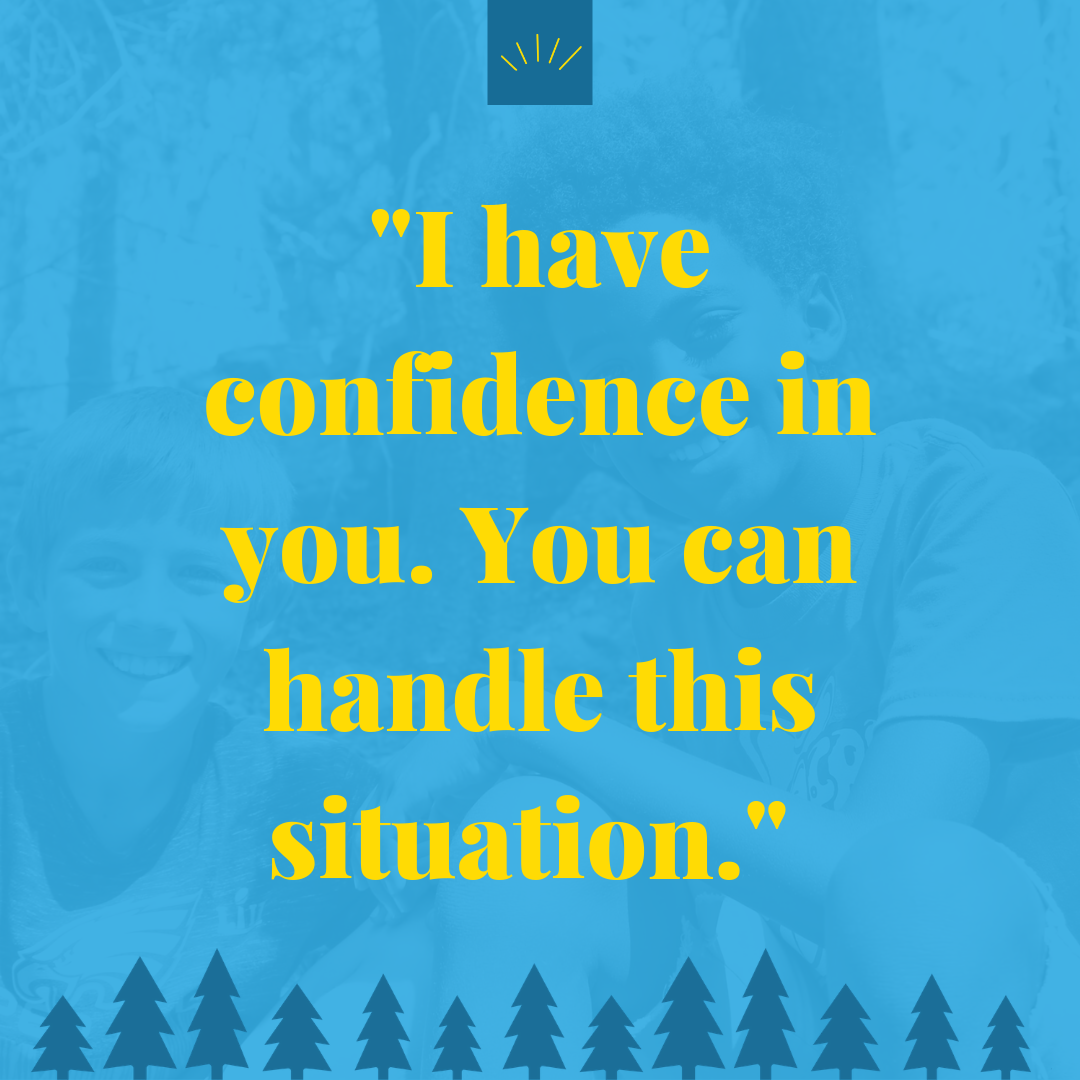
Audrey: “Think about what you used to do at different ages. That should really give you the confidence to know that your kids can probably be doing more than what you think they can right now.”
Sara: “When your kids are small you’re a caretaker. But then you transition into being their coach. And ultimately, you transition into being their consultant.”
Audrey: “It’s very tempting when something goes wrong to want to fight our kids’ battles. Instead, turn it around so they’re not a victim. Explain that it’s not all about them but it’s the other person’s bad behavior. Tell your kids, ‘I know you can handle this’ because–as we all know–when mom or dad does step in or talks to the teacher, it doesn’t usually work out very well.”
Audrey: “It’s never as clear as it looks. We all have our moments and all of our kids have the capacity when their feelings are hurt, or when they feel left out, to say something or do something that’s not kind.”
Audrey: “We can do so much for our kids, and build their social resilience and grit, by letting them know that it is normal to have people do rude things. It happens every day in life. If your kids are really young, you can empower them and give them the confidence that they have strategies to deal with it. That’s the kind of resilience you want your kids to have.”
Sara: “We often ask, ‘What do you think is the other side of the story?’ Just building that bit of empathy for the other side is so helpful. When we don’t crumble when our kids go through hard things and when we don’t panic and rush to rescue them, it teaches our kids that they can handle it too. They see us modeling our confidence and peace, trust in each other and in good decisions. Borrowing courage until you have your own is a pretty groovy tool to have. Sometimes as parents we have to reach out to friends and peers and borrow courage, as well. We are all human and need to help each other raise our kids.”
Audrey: “Remember stories from childhood and share them with your kids, especially the struggles you experienced. They need to see us as authentic, real people who had these same kinds of things happen to us because it’s really reassuring to them.”
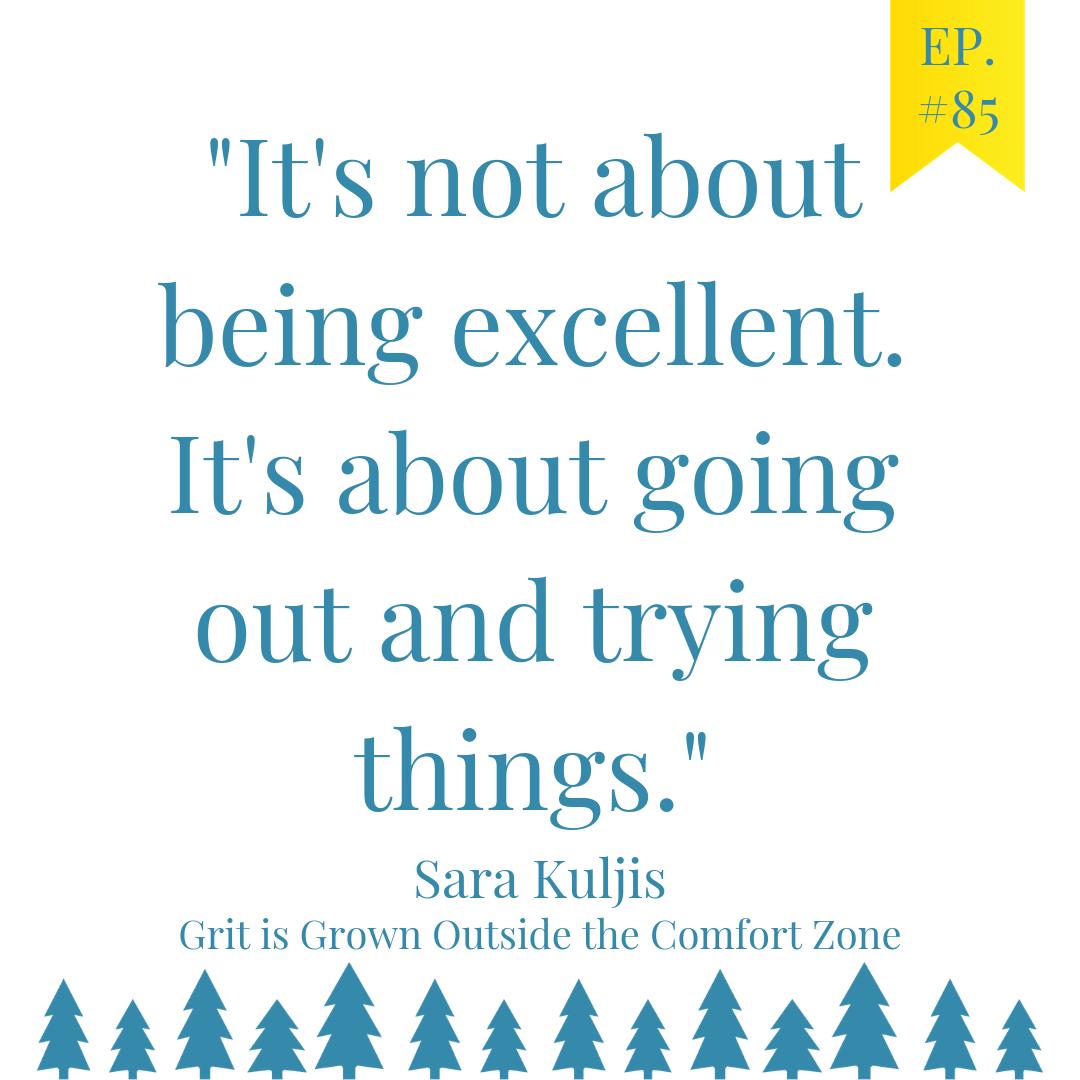
Audrey: “You grow grit from trying new things. There’s this model to teaching: first you do it for them, then, second, you do it with them. Then, you’re watching them and helping them do it, and then, finally, they’re doing it independently. You can think about that with anything from driving, to social stuff, to new sports that you’re teaching, riding a bike. That is how you help them to learn new things with your support.”
Audrey: “At camp we have to make everything fun, even putting sunscreen on. We’ve mastered the art of making mundane things fun. When you make mundane things fun at home, that just creates a really fun culture.”
Audrey: “Setting goals is a great grit-building idea. It’s something you can do as a family. You can all set a goal of something you want to try. Model for your child that you’re setting a goal and working towards it. My kids have learned much more from watching me do things than from me telling them to do something.”
Audrey: “I like the idea of a courage box where each person tries something they’re afraid of, or something new–it can be anything–but each person sets a goal to overcome that fear, of pushing their comfort zone. The idea is celebrating courage with your kids.”
Sara: “Take the heat out of having to be an expert the first time you try something. We don’t try a new sport to be on varsity or to be the best. Sometimes we try it because it’s fun, or we’re curious or just to try something new. We need to take away the pressure to excel that is so prevalent in our culture. It keeps kids from trying things. It is not about being excellent; It’s about going out and trying.”
Audrey: “Leadership, parenting, it’s all the same.”
Why is Kindness Important?
Listen to Sunshine Parenting Episode 165: Cultivating Kindness
Being considerate of others will take your children further in life than any college degree.
Marian Wright Edelman
Being a considerate, kind person who thinks about others is a character trait that helps children form good relationships and leads to a happier and more successful life as an adult.
What does this mean for super competitive parents who want their children to succeed at all costs, even if it means cheating and being mean to others? It could be helpful for parents to know that research has clearly shown that kind people are happier people, and happier people, in turn, are more successful in life. In jobs and in future relationships, kindness will take our children “further in life than any college degree.”
Focusing on kindness needs to be a higher priority for everyone who cares about children.
In our cut-throat, competitive culture, where assertiveness and achievement are glorified and valued, focusing on developing kindness is often overlooked.
There are anti-bullying posters and speakers at most schools, but where is the message about the powerfully positive impact of kindness?
Parents and youth development professionals, including teachers, coaches, and camp staff, know that wording things positively and telling kids what we DO want them to do is far more effective than a list of “don’ts” and “nos.” So, why hasn’t this message translated into how we teach children to treat one another?
We’re talking with children a lot about not bullying each other, but we’re not talking with them enough about what we want them to be doing instead — which is, of course, to treat each other with respect and kindness. I propose that as parents and youth development professionals we flip the “anti-bullying” message into a “pro-kindness” one.
Ways to model and practice kindness
- Get kids to focus on kindnesses that they have seen by asking them to point out kind acts they have witnessed or done.
- Brainstorm with kids kind things they can do for others and help them follow through. Focus on small, easy kindnesses rather than huge things.
- Talk with kids about how they feel after someone has done something kind for them or after they’ve done something kind for another person.
- Questions to Ask Kids to Spur Conversations about Kindness:
• Share something kind they’ve seen someone else do this past week.
• What’s the kindest thing someone has ever done for you?
• What are kind things we can do for our friends? Siblings? Parents? People we don’t know?
• How do you want to be remembered by your classmates and friends?
“You can’t live a perfect day without doing something for someone who will never be able to repay you.”
— John Wooden
This topic is so important to Gold Arrow Camp and to Sunshine that she dedicated an entire chapter of her book, Happy Campers, to it: Camp Secret #8: Make it Cool to be Kind. Each chapter of Happy Campers ends with five different “Bringing Camp Home” activities to consider trying in your family.
More Kindness Ideas & Resources
Read (or listen to) Wonder by R.J. Palacio
One of GAC counselors’ favorite read-aloud books is R.J. Palacio’s Wonder. Consider reading (or listening – Audible version is free right now if you sign up for a free Audible trial) to Wonder individually or as a family read-aloud. Get some popcorn and have a family movie night to watch the movie version after you finish reading.
Do you like Pinterest? Check out Sunshine’s Kindness board.
Being Kind Makes Kids Happy, Greater Good Science Center
The Power of Kindness, American Camp Association
Happiness Tip: Commit to Kindness (Christine Carter, Raising Happiness)
The Positive Impact of Camp Experiences: American Camp Association Research
Listen to Episode 87 of the Sunshine Parenting Podcast: The Impact of Camp Experiences with Dr. Laurie Brown.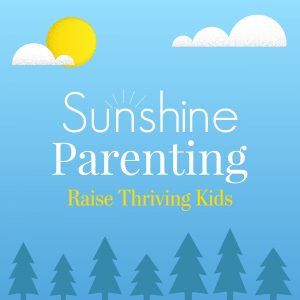
In this episode of the Sunshine Parenting Podcast, I interview Dr. Laurie Browne, Director of Research for the American Camp Association, about the five-year camp impact study being done by an external research team through the University of Utah. The study explores the lasting impacts and the ways camp experiences prepare young people for college, their careers, and their lives beyond camp.
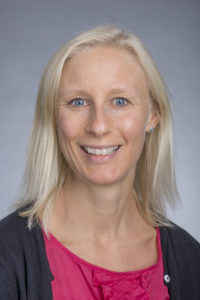
I hope you enjoy this conversation with Laurie and learn more about the incredible research that’s finding that camp truly does have an amazingly positive impact on the development of young people.
BIG IDEAS
- The ACA wants to make sure that camps thrive into the next century and that they serving more campers and in better ways.
- The heart of this five-year study consists of three major components: the youth, the staff, and leadership development. Its objective is to determine the lasting impacts of camp and the interplay between camp, school, home, and future jobs. Through this study of over 500 families, they will identify camp’s role in the “learning landscape”.
- The data collection and analysis is being done by an independent research institution outside of the ACA through the University of Utah.
- We discuss:
- the outcomes and benefits for parents who prioritize camp.
- the importance of having other adults to mentor our children, especially the positive influence of camp counselors.
- what families and schools can learn from camp
- having campers reflect on what they learned at camp so they can apply it to real life situations.
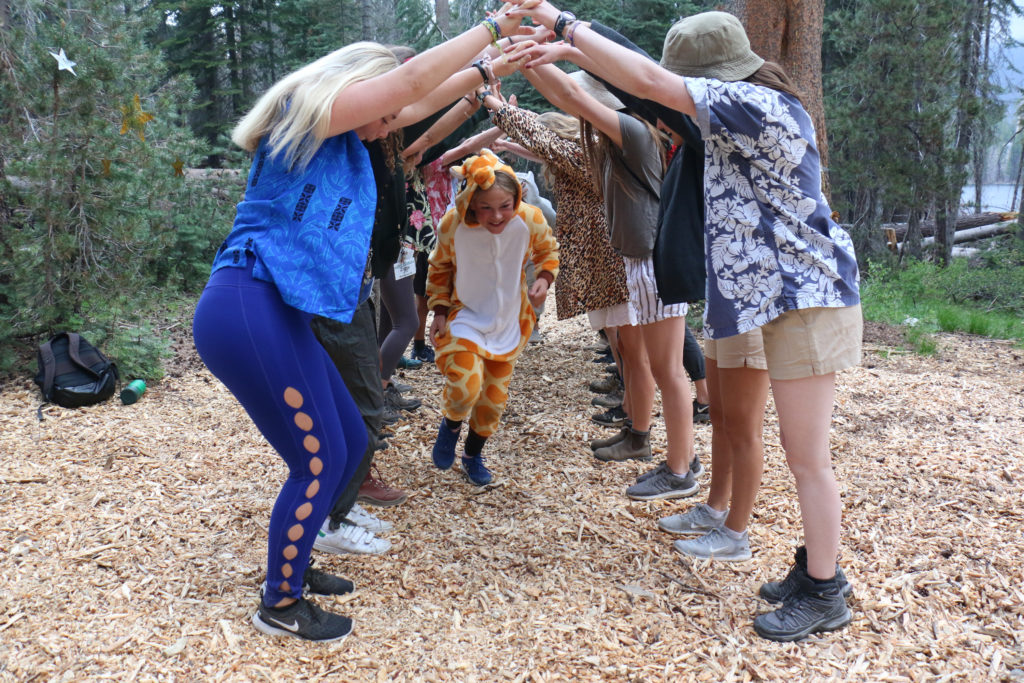
QUOTES
LAURIE: “This is a multi-layered study which builds off itself, starting with qualitative approaches, interviews, and surveys. Then the findings were quantified and a longitudinal study was designed which is tracking campers and their families over time.”
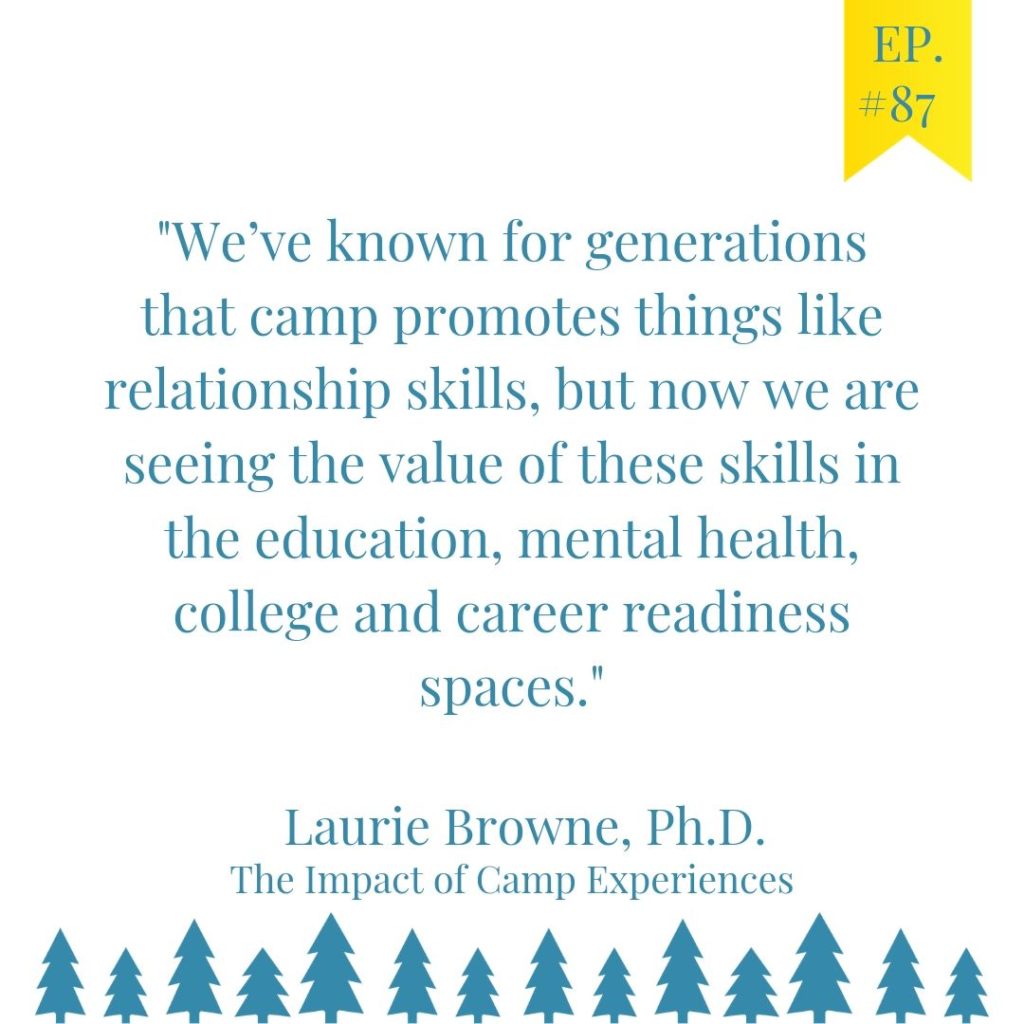
LAURIE: “We’ve known for generations that camp does great things for kids. But I think the environment is far more ready for the type of social, emotional learning related outcomes that camp provides. We’ve known for a hundred years that camp promotes things like relationship skills, but only now we are seeing in the education, mental health, college and career readiness spaces, the value of relationship skills. We have employers saying that is the number one skill they expect in college graduates. That is harder and harder to find.”
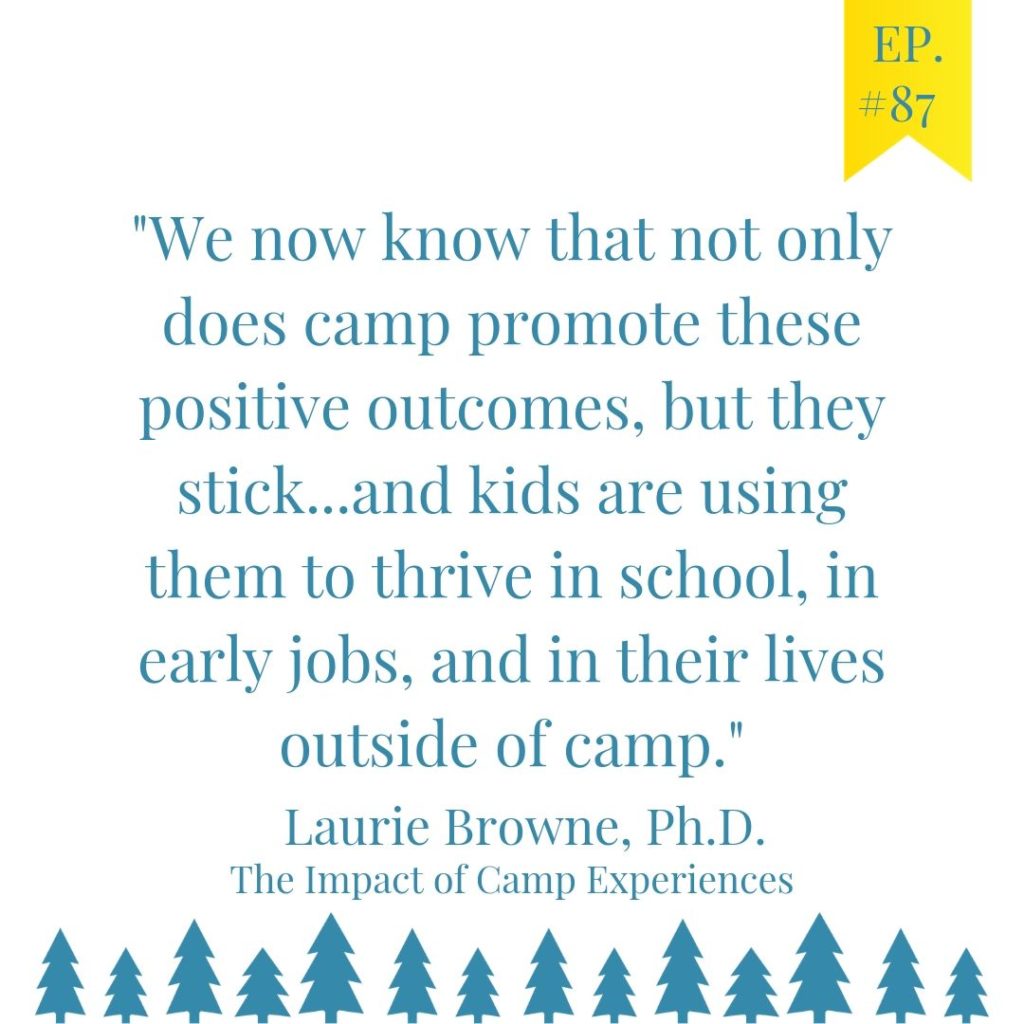
AUDREY: “Other places (school, sports) have another focus that is their most important priority (academics, sports skills) but at camp, our number one focus is on the community building, the cultural building, and training our counselors to facilitate friendships and relationships among campers.”
LAURIE: “It all layers on top of one another, the interplay between camp and school and home. All the spaces work together to create a thriving, successful child. And now we know that camp plays a very unique—even critical—role in that overall landscape.”
LAURIE: We’re interested in the family dynamic around camp. How do families choose to go to camp? How do they integrate camp with the other things in their lives? (In this study) parents are emerging as beneficiaries and have their own outcomes relating to camp. We’re specifically having parents share with us the value and benefits to them of sending their kids to camp, day camp and overnight camp. Parents are recognizing that kids come home and in many cases, are more active citizens in the family. So it improves family processes when they send their kids to camp. But specifically, in overnight camp experiences, parents are saying, ‘I’m a better parent. I get some time to connect with my partner, to engage in some of the things I don’t always get to do when I am busy caretaking.’ Then when the kids come back, they are really happy so as a family unit, it brings all kinds of benefits to parents as well.”
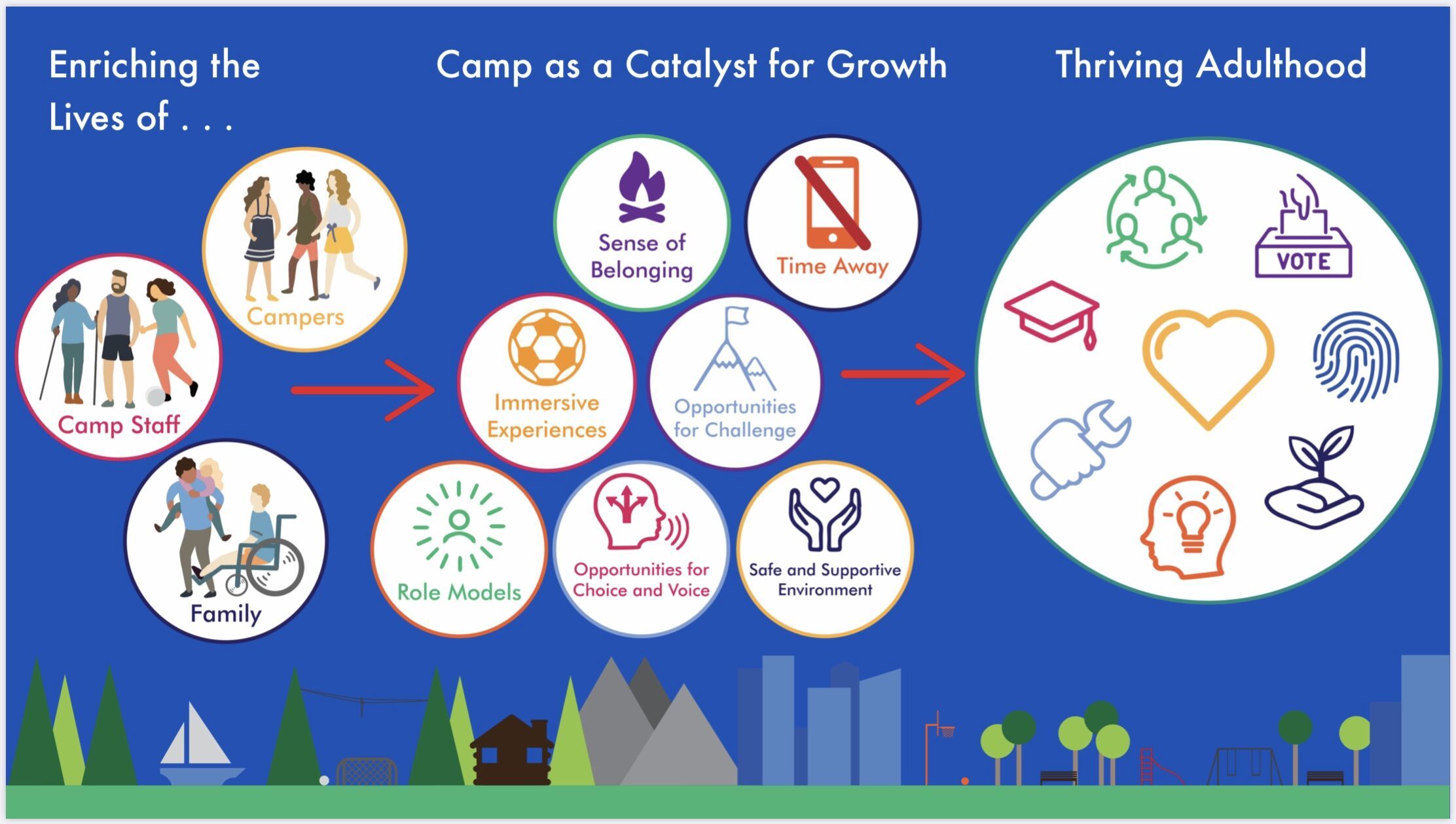
AUDREY: “I’ve heard from many parents that it’s almost a relief to know their children are being taken care of. They can relax. They don’t need to be monitoring, following, texting. It’s a much-needed break for parents who feel so much pressure to be so involved with everything. For so many parents who are working and taking care of kids, their lives are so full that what often gets neglected is their own well-being and what brings them happiness.”
AUDREY: “I tell parents to use the time when their kids are at camp to have their own ‘camp’ type of well-being experience: be with your spouse, your friends, do hobbies that you don’t normally have time to do, so that when your kids come home and have all these great things to share about what they’ve done, you can share, too.”
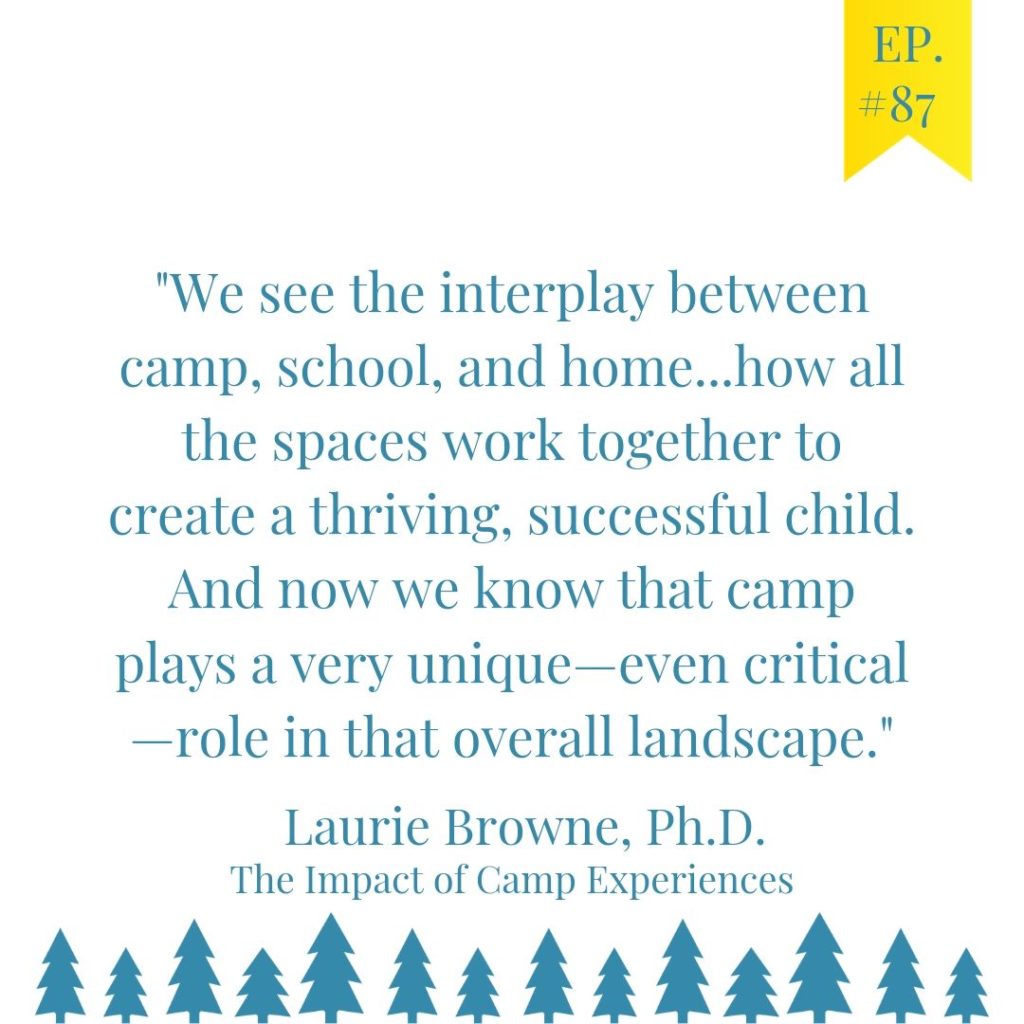
LAURIE: “We have to cultivate happiness by doing things other than work and caregiving. It’s an investment in our own well-being and we are better parents when we make that investment. I think as mothers we feel really inclined to set aside our well-being for our kids. But now there’s so much dialogue around the importance of our time away from kids and to know that your child is thriving because they’re apart from you, is literally one of the findings we are seeing.”
LAURIE: “The opportunity for kids to practice a sense of independence and from that, they can develop a true sense of responsibility and not just that they do their chores but they see themselves as a responsible contributor to their family, to their community and they get to practice that at camp. There are benefits to campers and parents.”
AUDREY: “Even if you don’t send your kids to camp ever, it’s important to find other adults who can mentor your kids because there are some things that your kids either won’t do with you there or will be more tentative about trying. It’s okay for parents to know that you’re not supposed to be able to teach your child everything. That’s why you have teachers at school, sports coaches, camp counselors…So much of who my kids are is because of these amazing role models. How fun for them to get to learn from and interact with other adults. That’s the other lesson that camp can provide for parents: You don’t have to feel like you’re alone in this.”
LAURIE: “Camp counselors are simply younger and more relatable than a lot of the adults that kids encounter in other spaces of their lives. That closeness in age is a really critical opportunity not just for mentorship but for kids to see themselves as an emerging adult. Camp counselors seem attainable. Our staff members are the ones that are really modeling these outcomes, facilitating opportunities to learn and helping those outcomes to stick over time.”
AUDREY: “I think parents looking at camps need to know that you don’t need a fancy facility or fancy equipment. It really is all about the camp counselors—how they treat kids and how focused they are on the kids as their top priority.”
LAURIE: “A culture of caring, a culture of inclusiveness, a culture of belonging is created by all the people combined. We have staff, and then we have campers, but you put all of them together with the traditions and the norms of camp and that creates a culture that in and of itself is so powerful as a mechanism for lasting learning. It’s about intentional culture building around care, safety, and inclusiveness—it’s really what matters.
LAURIE: “What a great opportunity to practice being a member of a community that isn’t their family—especially in adolescence. As kids grow up, they have to be able to see themselves in worlds outside of their homes. That’s a critical part of their developmental process.”
LAURIE: “Kids are making connections between camp and home and school. What a great opportunity for parents, educators and camp professionals to help bring more visibility to those linkages. Help campers identify the connections between them.”
AUDREY: “We have kids reflect before they leave camp about what they’re going to bring home with them. We ask them, ‘what have you learned here that you’re going to use in your life’ and it’s amazing to hear them articulate what they’re going to take back. They learn these great things but they need to take the time to figure out how they’re going to translate this to the rest of their life, the other weeks of the year beyond camp.”
LAURIE: “Research is exciting, but it really doesn’t matter near as much as what really amazing camp professionals are doing with campers and staff. That’s where the magic happens.”
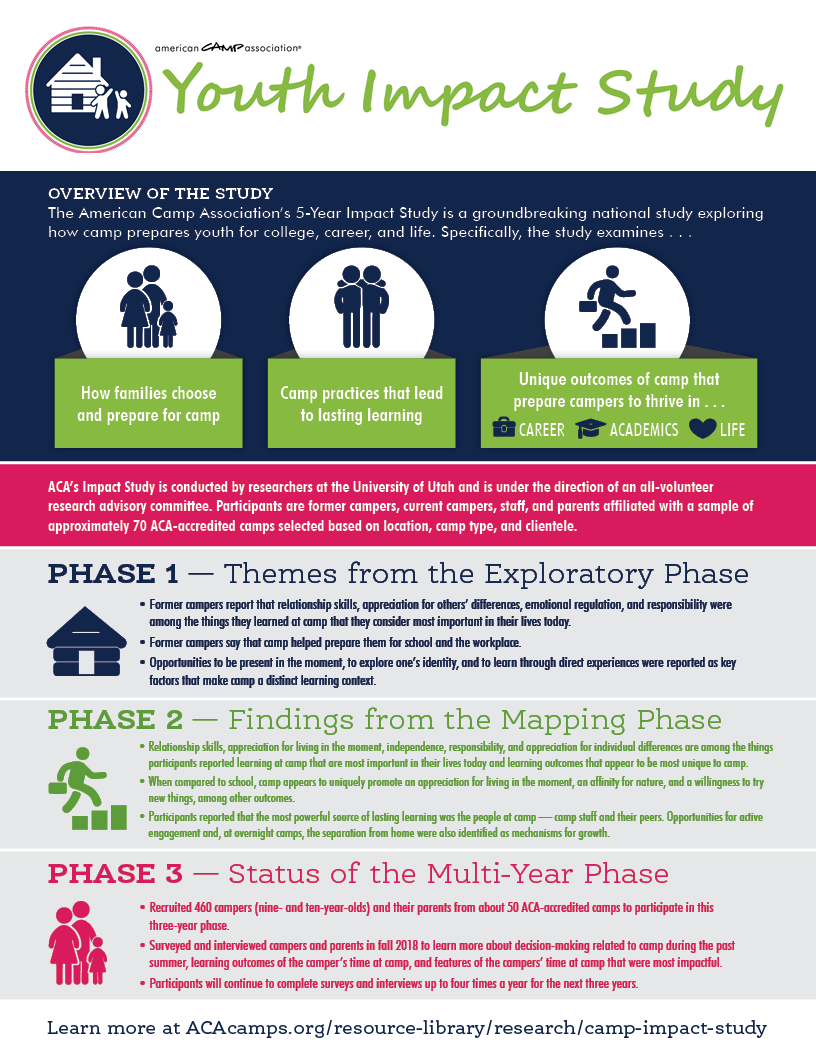
LINKS
Susan Pinker– The Village Effect Ted Talk
RELATED POSTS/PODCASTS
Research finds Children Learn Social Skills at Camp
Ep. 32: 10 Benefits of Summer Camp for Teens
Podcast originally published at Sunshine Parenting.
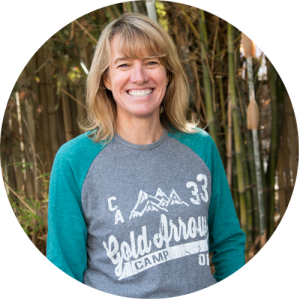
Audrey “Sunshine” Monke, MA, has been the owner of Gold Arrow Camp since 1989 and currently serves as the Chief Visionary Officer. In addition to her vision-casting and mentoring at GAC, Sunshine is an author (Happy Campers: 9 Summer Camp Secrets for Raising Kids Who Become Thriving Adults), podcast host, speaker and coach on the topics of parenting, social skills, and happiness. Find out more at her website, Sunshine Parenting.
Visit Sunshine Parenting for more summer camp-related posts & podcast episodes.
Teaching Campers the Friendship Skill of Asking Questions
Each session at camp, we talk about and practice friendship skills. One skill that is really helpful in making friends is learning to ask questions. Questions help keep a conversation flowing and help us get to know others better. Here’s Sunshine talking about why this is an important social skill our kids need to practice:
We have campers brainstorm – with their cabin groups – two or three questions that would be fun to ask their friends. We type up all of the questions and put them on index cards on large rings for each cabin group. These question rings stay on our dining tables as a helpful tool for campers to connect with one another.
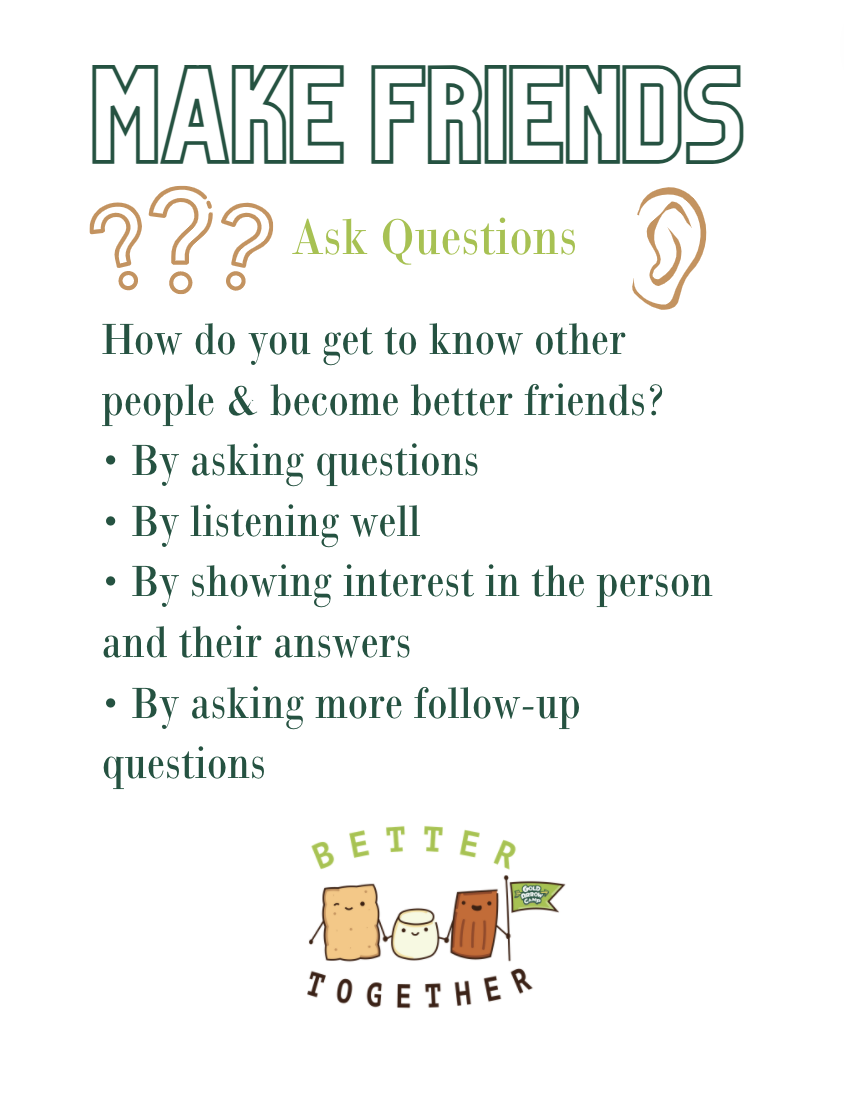
All summer long, we use the questions to spark fun conversations.
If you’d like to use the questions at home, you can download them here.
Resources/Related
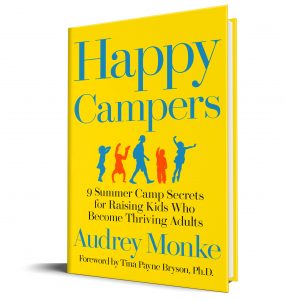 Download Sunshine’s “Questions for Connection,” one of many helpful resources from her book HAPPY CAMPERS: 9 Summer Camp Secrets for Raising Kids Who Become Thriving Adults.
Download Sunshine’s “Questions for Connection,” one of many helpful resources from her book HAPPY CAMPERS: 9 Summer Camp Secrets for Raising Kids Who Become Thriving Adults.
36 Questions to Get Closer to Someone You Love
The Importance of Cabin Group Activities
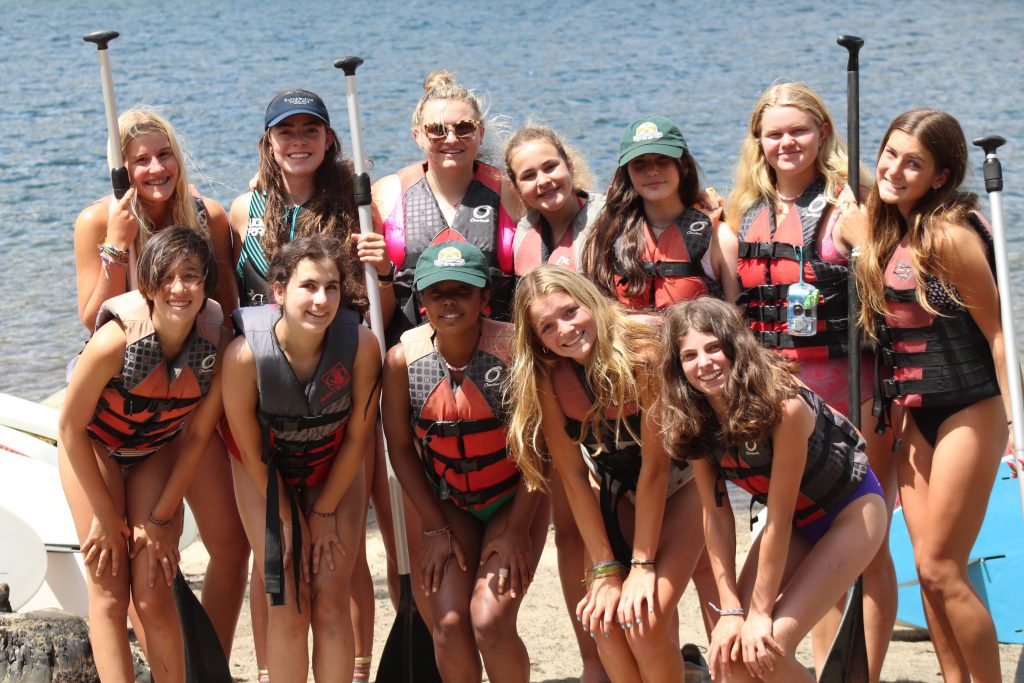
By Alison “Bean” Moeschberger
The program at Gold Arrow has been designed to provide campers with a variety of experiences and opportunities while they are at camp. Rather than focusing on skill progression in one area, we feel it is important for campers to be introduced to activities they may not have chosen to do on their own. We strive to create a supportive and encouraging environment in which campers feel comfortable pushing their own boundaries and can learn about themselves as they conquer fears, face challenges, and live in community with others.
Cabin groups are scheduled to participate in activities together for two of the three activity periods each day. During cabin activities, the Group Counselor plays a key role in fostering personal growth in campers. These specialized 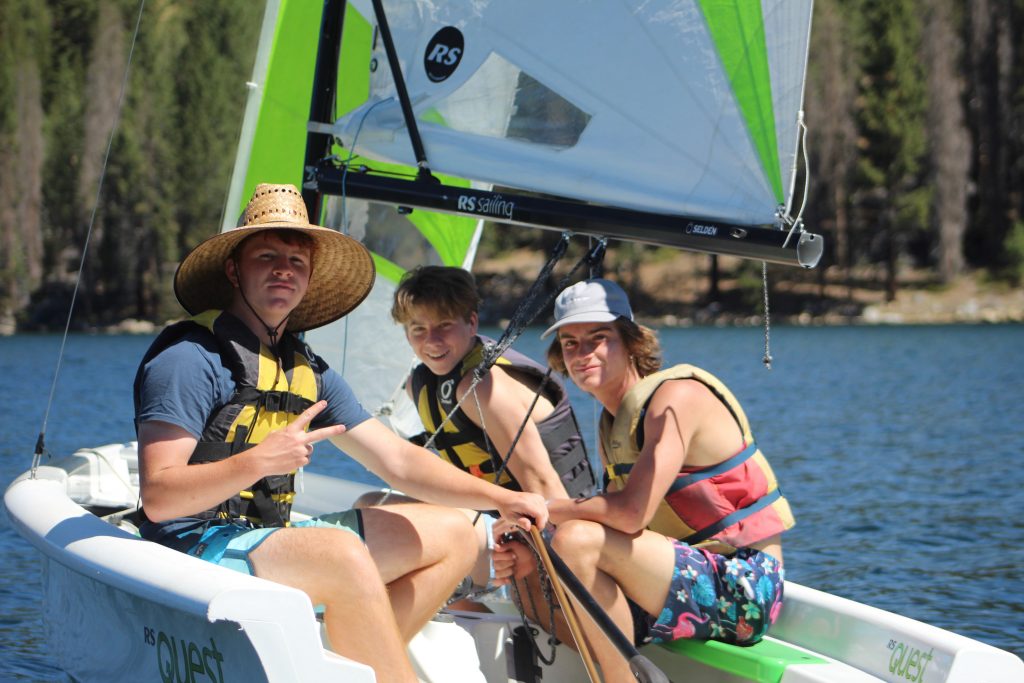 counselors attend activities with the cabin group and help campers set personal and group goals and hold the group accountable for reaching their goals and encouraging others. Participating in activities as a cabin group allows campers to take risks and push themselves in a safe, supportive environment. Through watching cabin mates overcome fears and accept new challenges, campers learn resilience and empathy. Everyone’s role in the group is necessary, and the Group Counselor serves to build and enhance the supportive community so that the cabin group feels like a family.
counselors attend activities with the cabin group and help campers set personal and group goals and hold the group accountable for reaching their goals and encouraging others. Participating in activities as a cabin group allows campers to take risks and push themselves in a safe, supportive environment. Through watching cabin mates overcome fears and accept new challenges, campers learn resilience and empathy. Everyone’s role in the group is necessary, and the Group Counselor serves to build and enhance the supportive community so that the cabin group feels like a family.
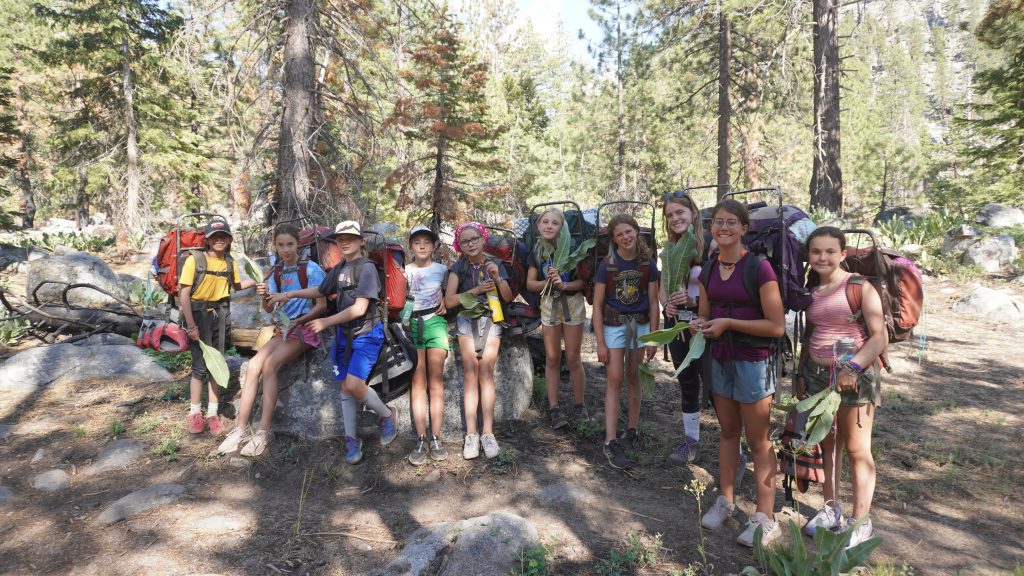
The third activity period of the day, called “Free Time,” gives campers an opportunity to sign up for activities as individuals. Campers can try special activities that are only offered during this period or return to an activity they enjoyed with their cabin group.
You can find out more information on activities offered at Gold Arrow Camp here.
4 Reasons Not to Worry While Your Kid is at Camp
Listen to Sunshine Parenting Podcast Episode 91: 4 Reasons Not to Worry While Your Kid is at Camp.
Worrying when our kids are away from us is normal for parents. Every time I’ve ever dropped my kids off for a new adventure without me, I’m excited for them. But I’m also concerned about their safety, secretly wishing they would just STAY HOME, then counting the days until they return. I know it’s not rational (few things about parenting are), but I believe my kids are always safest when they’re home with me.
If you are new to sending your kids to summer camp, let me reassure you that while they are away, you can relax your worrying muscles. I’ve spent more than three decades working at a summer camp, sending my kids to other camps, and participating in the networking and training of summer camp professionals. I know A LOT of camp directors, have visited many camps through the American Camp Association accreditation process, and am a faithful reader of Camping Magazine. I definitely know about camp.
In Episode 91 of the Sunshine Parenting Podcast, I chat with my longtime friend, Camp Owner/Director Maria Horner. Maria and her husband, Tom, have been the executive directors of Catalina Island Camps since 1995. In this episode, we discuss four reasons not to worry while your child is at camp.
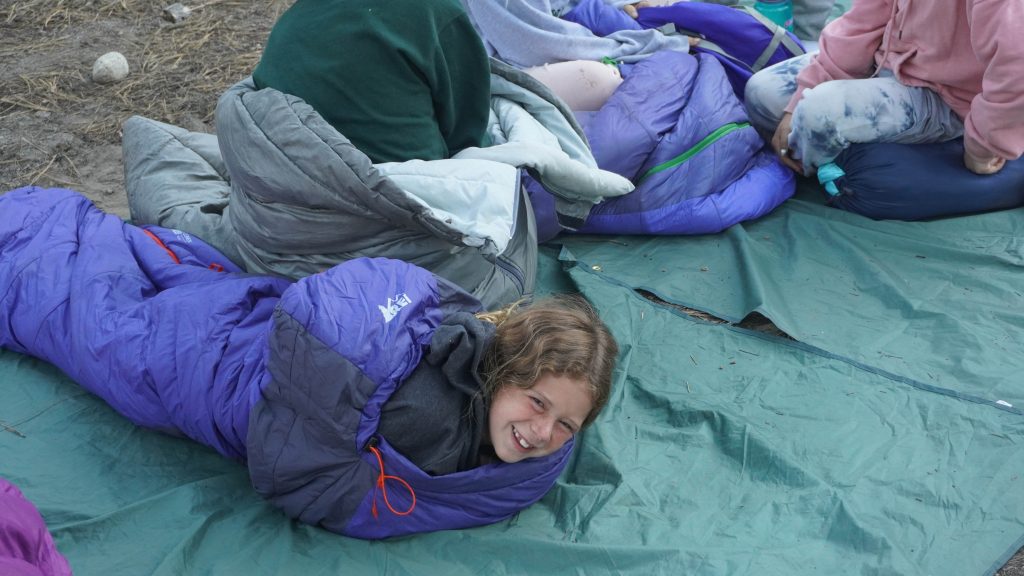
Reason #1: Accreditation from the American Camp Association
You have chosen a camp program that’s accredited by the American Camp Association. This means that the camp meets the ACA’s high standards to ensure a safe and nurturing environment for your child.
Reason #2: Your Communication with Camp
You have been in touch with the camp director. Always be upfront with any issues your child may be dealing with so that the staff can be prepared to help them. Take time review at all the material that the camp has sent you ahead of time and phone them with any questions you may have.
Reason #3: Preparation of Your Child
You have prepared your child for the experience:
- You’ve allowed your child the opportunity to sleep away from home with adults other than parents.
- You’ve reviewed the materials from the camp with your child.
- You’ve packed for camp together so they know what they are bringing with them.
- You’ve talked to your child about camp, focusing on the fun. Develop strategies with your child to address anything they may be feeling nervous about.
- You’ve expressed confidence in your child. Say, “I know you’re going to have a great time and enjoy this!”
Reason #4: Parent Preparation
You have prepared yourself for the experience:
- Manage your expectations.
- Be realistic about contact with your child while they’re gone.
- Don’t over analyze the communication you do get from your child.
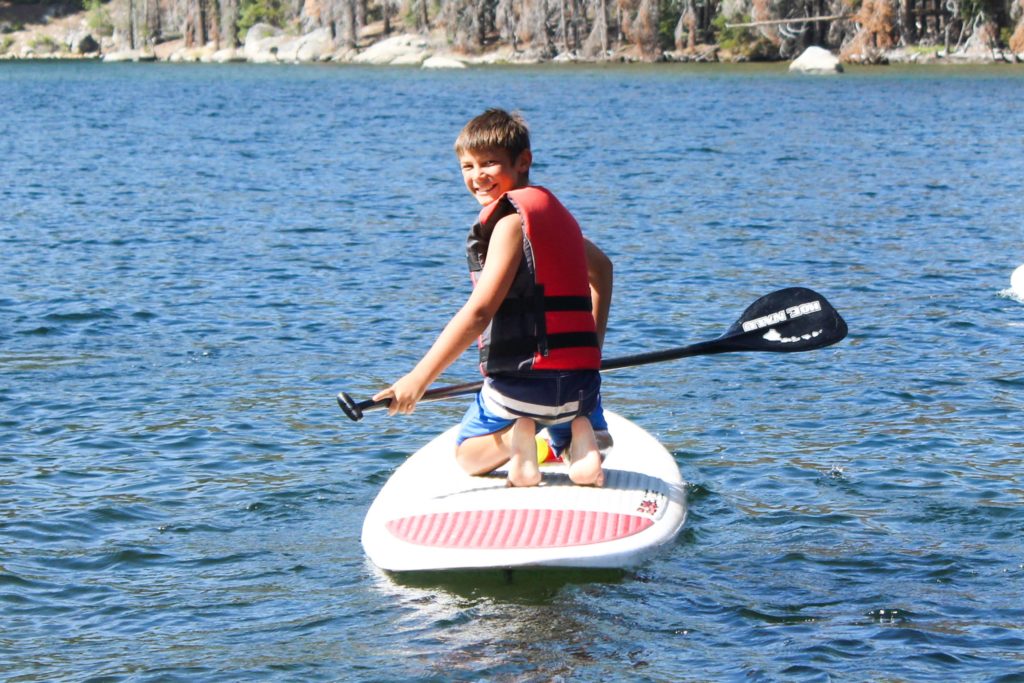
Want more reasons not to worry? Read this Sunshine Parenting post: 5 Reasons NOT to Worry While Your Kids are at Camp.
Quotes from this Episode
Audrey: “One of the reasons not to worry is actually the amount of training we do with our staff.”
Maria: “You chose an accredited camp, so if you’re coming to my camp, or if you’re going to any other camps in your Happy Campers group, those camps are all accredited by the American Camp Association, which means that those camps care enough to undergo a thorough peer review of its operation. And that includes everything from staff quality and training to emergency management–all things that they’re doing voluntarily to ensure that their program is top notch.”
Maria: “Camp professionals from around the country can volunteer to be what we call standards visitors. So every five years, a team of trained standards visitors go into each accredited camp and observe, both through documentation and practices actually in place, based on the identified standards, to see that the camps are in compliance with all of them.”
Maria: “If you’re going to allow me to take care of your child for two or three or four weeks during the summer, I’d actually think it stranger if you don’t want to talk to me first. I would imagine you would want to know who’s the person in charge of the place where your child’s going to be spending a lot of time. Pick up the phone and actually talk to the person who is running the show.”
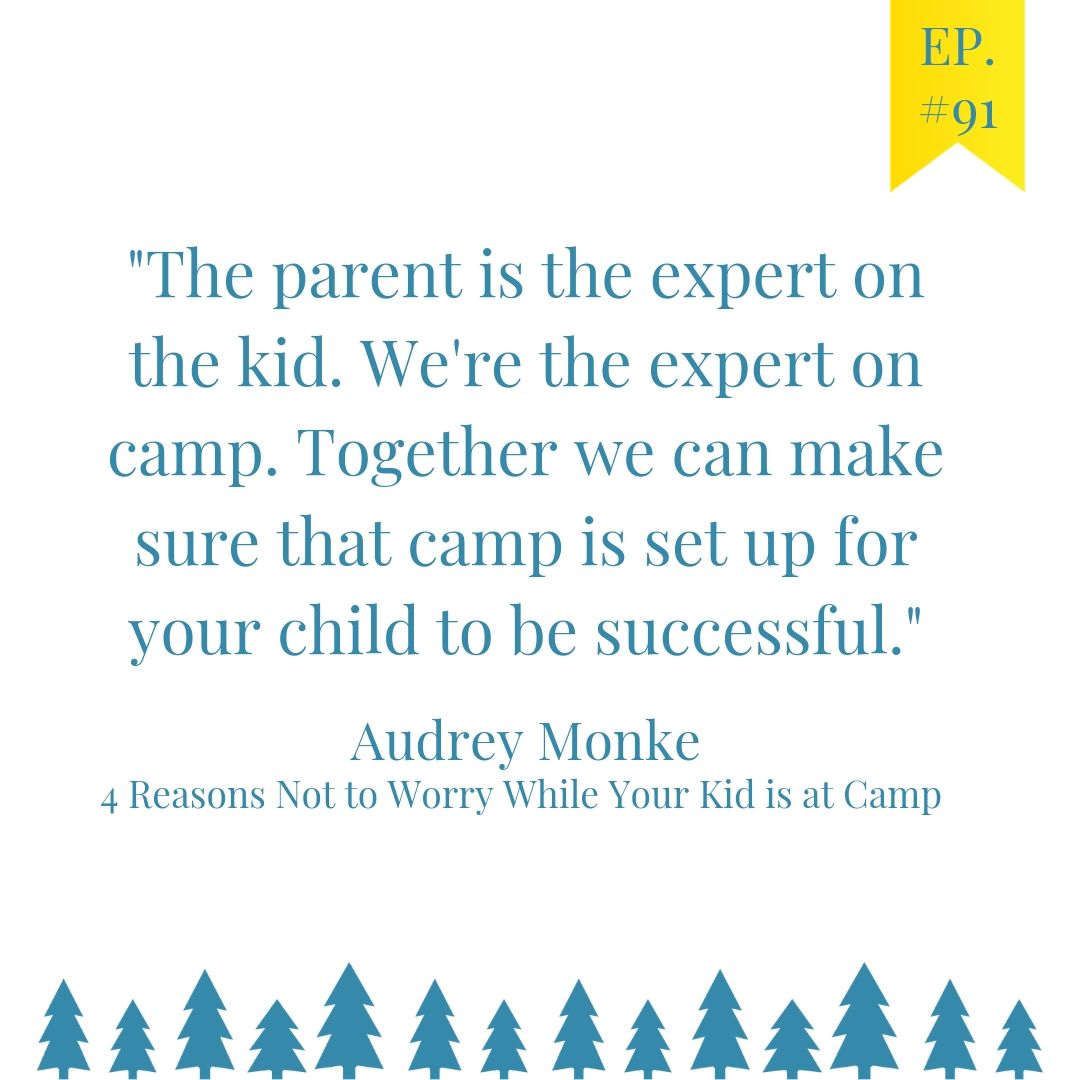
Maria: “I really encourage parents to be as upfront and transparent about your child as possible. We can do a lot at our camp and we can do it way more successfully when we know in advance. If we have to spend a few days figuring out what’s going on with the kid, either socially or behaviorally, or even with their food issues, that’s time lost. If we knew that up front, we would be able to meet those needs right from the very beginning.”
Maria: “Get online and watch videos from camp. Besides our promotional videos, we have a program with our go-pro cameras and the kids make videos every summer. And that’s a great way to get an insight into what camp looks like through the eyes of our campers.”
Maria: “I think you really want to focus on the fun when you talk with your child. I think definitely engage your child in conversation to get a sense of their excitement level and if there are things that they are nervous about, you work together to develop strategies for the child to be able to address those.”
Maria: “It’s okay for me to be nervous, as a mom. It’s not okay for me to project that onto my child.”
Audrey: “What I really want parents to communicate to their kids is: ‘Hey, at camp there are all these adults there to help you have a great experience. So if you need anything and I’m not there, here are some people you can talk to: your counselor, the camp director Maria, the head counselors.’ I think that if you look on the website, or call the camp, you can find out who those people are. I think that empowering your kid to talk to those people is really important.”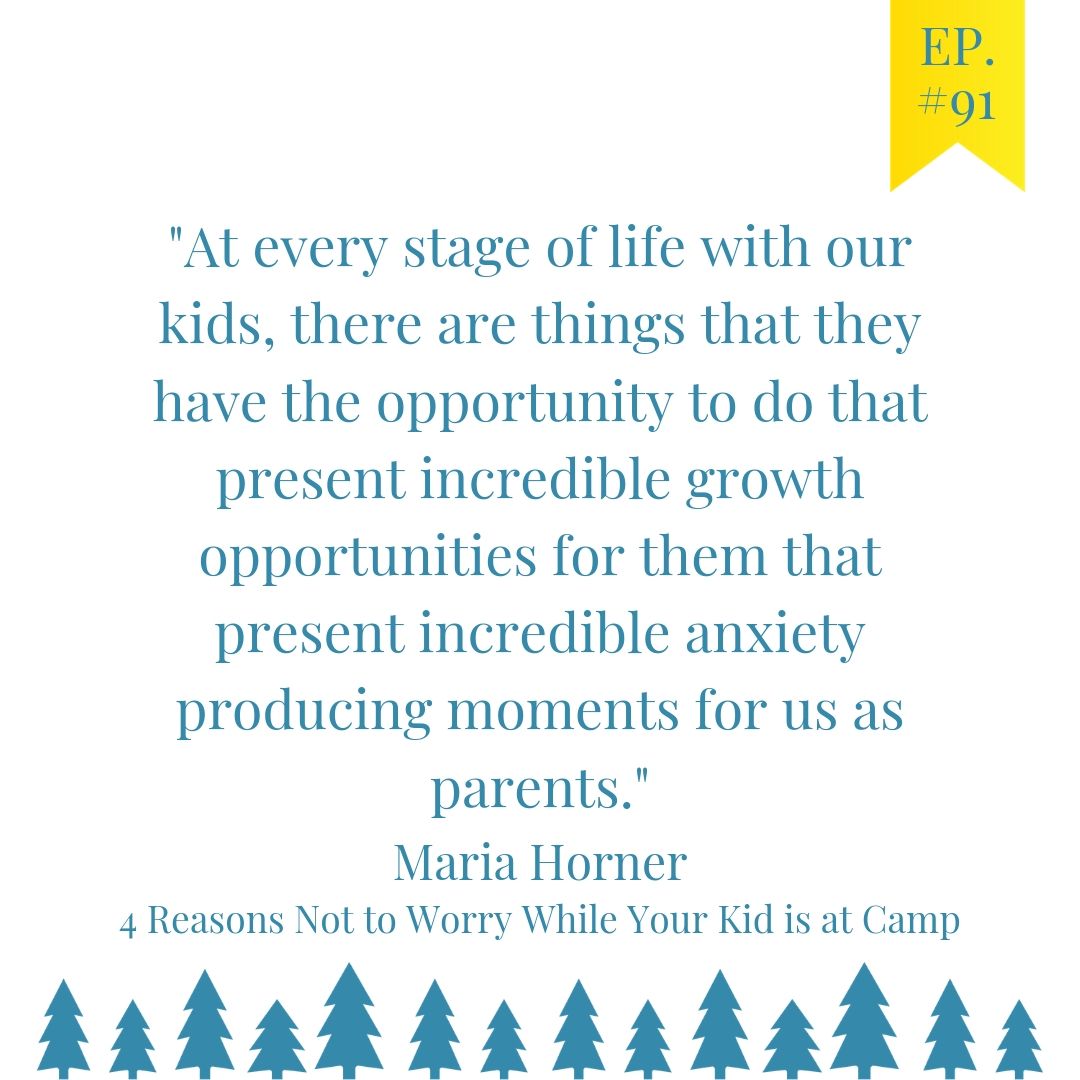
Audrey: “I do think we are very connected with our kids, which is a good thing and close relationships are fantastic. But the dark side is that it makes it a little harder–when your child’s doing something independent from you–for you to have the separation.”
Maria: “One of the things that I often tell parents is to really take advantage of this opportunity. Consider what it means to have some time either just to yourself or for you and your spouse together. That doesn’t happen very often in the craziness of life and raising children.”
Maria: “We tell kids, it’s okay to miss home when you’re at camp. You can miss home and still have fun at camp at the same time. Those two things aren’t in conflict with one another. The same thing is true for the parent’s side. Of course, you miss your child and worry about them. That’s to be expected. And you can still allow them to have this amazing growth experience, even if you’re a little bit nervous.
Audrey: “Give yourself permission to enjoy yourself. Spend some more time on a hobby you haven’t had time for, go out to dinner, go to movies–there’s nothing wrong with that. And actually, you giving your child the gift of a more relaxed, happier parent when they get home from camp is amazing.”
Maria: “It okay to have an incredible experience not all together. It’s okay to let your child do fun things without you and it’s okay to do fun things without them.”
Audrey: “It’s always this kind of mixed bag; you’re excited for your kid when they have some new adventure or get some great job far away, but then you’re also like, ‘Oh bummer. They’re kind of far away.’ I think always keeping these things in mind that it’s okay to have both feelings.”
Resources & Related Posts
5 Reasons NOT to Worry While Your Kids are at Camp
100 Questions about Summer Camp
Why choose an ACA accredited camp?
What are good questions to ask when selecting a camp program?
Ep. 10: Homesick & Happy with Michael Thompson, Ph.D.
Ep. 76: Partnering with Your Child’s Camp Director
Ep. 37: How to Prepare for Overnight Summer Camp
Ep. 87: The Impact of Camp Experiences
How to Raise an Adult, Julie Lythcott-Haims
How Camp Helps Parents Raise Adults
Other Sunshine Parenting Podcast Episodes featuring Maria Horner:
Ep. 22: Jedi Mom Tricks, Part 1
Ep. 33: Jedi Mom Tricks, Part 2
Ep. 42: Jedi Mom Tricks, Part 3
Links
Podcast originally published at Sunshine Parenting.

Audrey “Sunshine” Monke, MA, has been the owner of Gold Arrow Camp since 1989 and currently serves as the Chief Visionary Officer. In addition to her vision-casting and mentoring at GAC, Sunshine is an author (Happy Campers: 9 Summer Camp Secrets for Raising Kids Who Become Thriving Adults), podcast host, speaker and coach on the topics of parenting, social skills, and happiness. Find out more at her website, Sunshine Parenting.
Visit Sunshine Parenting for more summer camp-related posts & podcast episodes.
The Magic of The Campfire
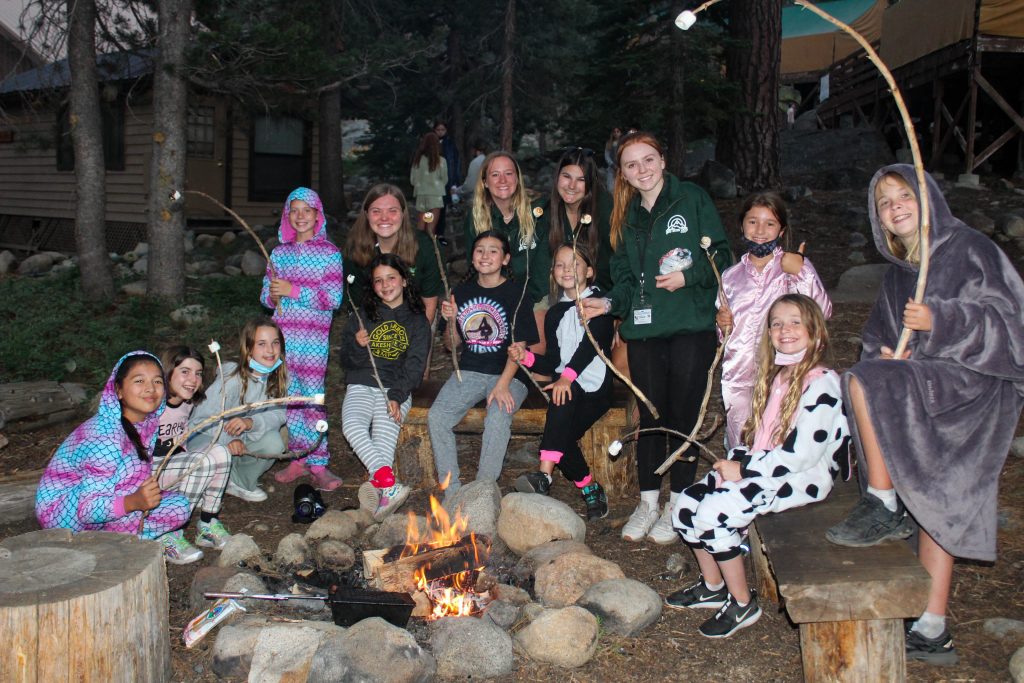
by Andy “Soy” Moeschberger
My single favorite time of day at camp is campfire. Every night each of our 31 cabins has its own campfire unless the cabin is at a social (a campfire with another cabin) or our dance. Why do I love this time of day so much? In part because I love the smell of woodsmoke. In part because it means the day is winding down and I’ll be in bed within the next 3 hours. But mostly because of the magic.
What could be so magical about a campfire? Some logs, some pine needles, a match, and some popcorn. That’s simple and fun, but it isn’t magic.
I beg to differ. I think that the time spent around a campfire is magic. It’s transformational and powerful in the way that nothing else I have experienced in my life is. When a group of 10 friends is gathered around the flickering flames under a blanket of stars they can and will share truths that are more lasting and meaningful than if they were in a game room or around a dining room table.
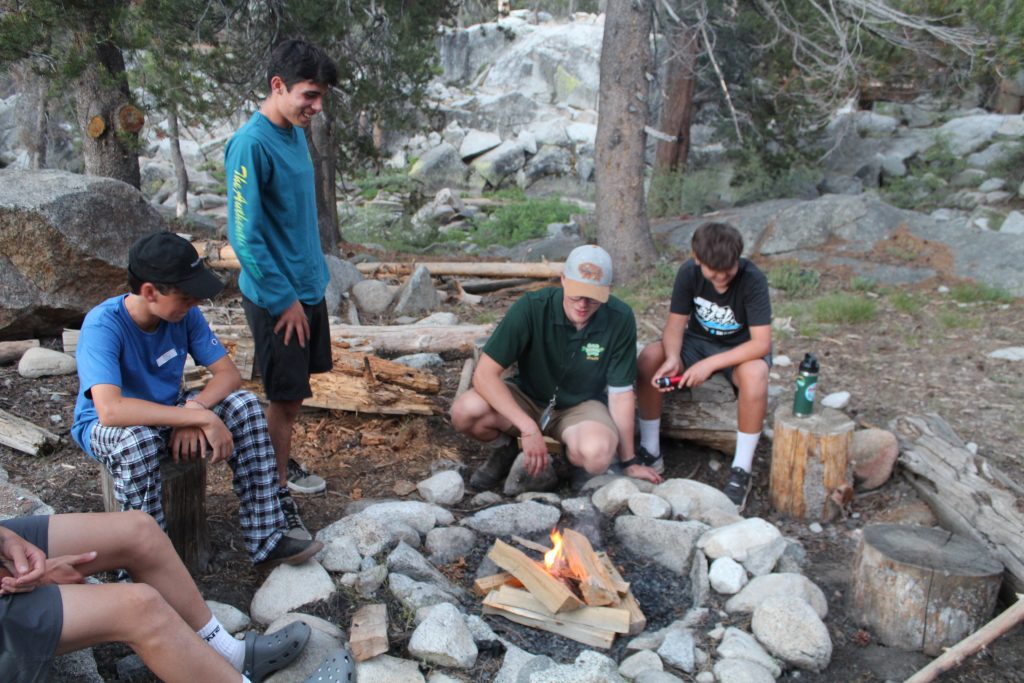
But why? What is it about the campfire that makes this possible? Well, maybe it isn’t magic. Maybe it’s science. According to a study from the University of Alabama, adults who were exposed to a “fire with sound condition” (a video of a fire with the sound turned on) showed lower blood pressure and increased “prosocial” behaviors (such as smiling, making eye contact and engaging in conversation). And that was a VIDEO of a campfire with an adult by themselves! The authors hypothesize that this is an evolutionary development. They believe that for ancient humans the fire provided warmth and a way to cook, and also signaled the safety of numbers. Our ancient forerunners knew that by being around the campfire they could relax. Even a millennium after we moved indoors, our minds still subconsciously know that a fire is a place where we are safe.
Children need this more than ever today. The pressures of the world increasingly weigh on young people. If they can have an opportunity to feel, like the cavemen of old, relaxed and safe, then they can begin to become their best selves. The campfire is a natural way to do that. As I tell our graduating campers at their Paddle Ceremony, the most meaningful moments of their camp careers probably occurred around a campfire.
Many camps have only occasional campfires, or “flashlight” fires. While there are benefits to that, we know the nightly practice of an actual campfire is important. Our counselors are trained specifically on campfires. The training is far more than how to stack the logs and what the ideal marshmallow looks like. Indeed, they practice in our training how to lead a meaningful discussion around the fire. They lead campers in sharing their highs and lows of the day. They help to facilitate discussions about real life topics that campers are interested in or struggling with.
On our last night of camp, we gather for an all-camp campfire that we call Appreciation Campfire. There are songs and stories and skits. Off to the side of our amphitheater (which we call Big Campfire!), there is a campfire pit, where the logs crackle away merrily. As the night winds down, the flames grow lower and lower. At the end of the night, counselors share their appreciation for their cabins by candlelight as the last embers of the campfire glow.
That’s just a last tiny piece of magic before we go home.
